The TONA Research Committee presents these biographical sketches of many of the principal figures in the history of the original 13th Amendment. The biographical sketches are in alphabetical order by last name.
Compiled by Bob Hardison
From Public Domain Sources on the Web

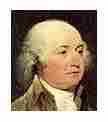 ADAMS, John, (father of John Quincy Adams), a Delegate from Massachusetts and a Vice President and 2d President of the United States; born in Braintree, Mass., October 19, 1735; was graduated from Harvard College in 1755; studied law; was admitted to the bar in 1758 and commenced practice in Suffolk County; joined the Sons of Liberty and argued against the Stamp Act; was elected to represent Boston in the general court in 1768; Member of the Continental Congress 1774-1777; signed the Declaration of Independence and proposed George Washington, of Virginia, for General of the American Army; became a member of the Board of War, but resigned to accept appointment as commissioner to the Court of France; Minister Plenipotentiary to Holland 1782; first Minister to England 1785-1788; elected in 1788 as the first Vice President of the United States with George Washington as President; reelected in 1792 and served from April 21, 1789, to March 3, 1797; elected President of the United States and served from March 4, 1797, to March 3, 1801; delegate to the constitutional convention of Massachusetts 1820; died in Quincy, Mass., July 4, 1826; interment under the old First Congregational Church, now called the United First Parish Church.
ADAMS, John, (father of John Quincy Adams), a Delegate from Massachusetts and a Vice President and 2d President of the United States; born in Braintree, Mass., October 19, 1735; was graduated from Harvard College in 1755; studied law; was admitted to the bar in 1758 and commenced practice in Suffolk County; joined the Sons of Liberty and argued against the Stamp Act; was elected to represent Boston in the general court in 1768; Member of the Continental Congress 1774-1777; signed the Declaration of Independence and proposed George Washington, of Virginia, for General of the American Army; became a member of the Board of War, but resigned to accept appointment as commissioner to the Court of France; Minister Plenipotentiary to Holland 1782; first Minister to England 1785-1788; elected in 1788 as the first Vice President of the United States with George Washington as President; reelected in 1792 and served from April 21, 1789, to March 3, 1797; elected President of the United States and served from March 4, 1797, to March 3, 1801; delegate to the constitutional convention of Massachusetts 1820; died in Quincy, Mass., July 4, 1826; interment under the old First Congregational Church, now called the United First Parish Church.

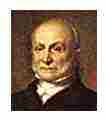 ADAMS, John Quincy, a Senator and a Representative from Massachusetts and 6th President of the United States; born in Braintree, Mass., July 11, 1767; acquired his early education in Europe at the University of Leyden; was graduated from Harvard University in 1787; studied law; was admitted to the bar and commenced practice in Boston, Mass.; appointed Minister to Netherlands 1794, Minister to Portugal 1796, Minister to Prussia 1797, and served until 1801; commissioned to make a commercial treaty with Sweden in 1798; elected to the State senate in 1802; unsuccessful candidate for election to the U.S. House of Representatives in 1802; elected as a Federalist to the United States Senate and served from March 4, 1803, until June 8, 1808, when he resigned, a successor having been elected six months early after Adams broke with the Federalist party; Minister to Russia 1809-1814; member of the commission which negotiated the Treaty of Ghent in 1814; Minister to England 1815-1817 and assisted in concluding the convention of commerce with Great Britain; Secretary of State in the Cabinet of President James Monroe 1817-1825; in 1825 the election of the President of the United States fell, according to the Constitution of the United States, upon the House of Representatives, as none of the candidates had secured a majority of the electors chosen by the States, and Adams, who stood second to Andrew Jackson in the electoral vote, was chosen and served from March 4, 1825, to March 3, 1829; elected as a Republican to the U.S. House of Representatives for the Twenty-second and to the eight succeeding Congresses, becoming a Whig in 1834; served from March 4, 1831, until his death; chairman, Committee on Manufactures (Twenty-second through Twenty-sixth, and Twenty-eighth and Twenty-ninth Congresses), Committee on Indian Affairs (Twenty-seventh Congress), Committee on Foreign Affairs (Twenty-seventh Congress); unsuccessful candidate for Governor of Massachusetts in 1834; died in the Capitol Building, Washington, D.C., February 23, 1848; interment in the family burial ground at Quincy, Mass.; subsequently re-interred in United First Parish Church.
ADAMS, John Quincy, a Senator and a Representative from Massachusetts and 6th President of the United States; born in Braintree, Mass., July 11, 1767; acquired his early education in Europe at the University of Leyden; was graduated from Harvard University in 1787; studied law; was admitted to the bar and commenced practice in Boston, Mass.; appointed Minister to Netherlands 1794, Minister to Portugal 1796, Minister to Prussia 1797, and served until 1801; commissioned to make a commercial treaty with Sweden in 1798; elected to the State senate in 1802; unsuccessful candidate for election to the U.S. House of Representatives in 1802; elected as a Federalist to the United States Senate and served from March 4, 1803, until June 8, 1808, when he resigned, a successor having been elected six months early after Adams broke with the Federalist party; Minister to Russia 1809-1814; member of the commission which negotiated the Treaty of Ghent in 1814; Minister to England 1815-1817 and assisted in concluding the convention of commerce with Great Britain; Secretary of State in the Cabinet of President James Monroe 1817-1825; in 1825 the election of the President of the United States fell, according to the Constitution of the United States, upon the House of Representatives, as none of the candidates had secured a majority of the electors chosen by the States, and Adams, who stood second to Andrew Jackson in the electoral vote, was chosen and served from March 4, 1825, to March 3, 1829; elected as a Republican to the U.S. House of Representatives for the Twenty-second and to the eight succeeding Congresses, becoming a Whig in 1834; served from March 4, 1831, until his death; chairman, Committee on Manufactures (Twenty-second through Twenty-sixth, and Twenty-eighth and Twenty-ninth Congresses), Committee on Indian Affairs (Twenty-seventh Congress), Committee on Foreign Affairs (Twenty-seventh Congress); unsuccessful candidate for Governor of Massachusetts in 1834; died in the Capitol Building, Washington, D.C., February 23, 1848; interment in the family burial ground at Quincy, Mass.; subsequently re-interred in United First Parish Church.

AMES, Herman Vandenburg, PhD, 1865-1935. Historian and faculty member of the History Department of the University of Pennsylvania. The Constitution was hardly a hundred years old when Dr. Ames managed to compile an entire volume of congressional proposals for its alteration, "The Proposed Amendments to the Constitution of the United States during the First Century of its Existence" - 1896 (New York: B. Franklin, reprint 1970). The Herman V. Ames Fellowship in American History is awarded in his honor.
The Virginia Resolutions of 1799, drafted by Madison and adopted January 4, 1799--and his lengthy 1799 Report to the General Assembly (adopted January 7, 1800) in explanation and support of its Resolutions of December 21, 1798--were intimately related to the famous Kentucky Resolutions drafted by Jefferson and adopted by the Kentucky Legislature on November 10, 1798. All of these Resolutions were in defense of the rights of the people and of the States, as reserved by the Constitution and expressly by the Ninth and Tenth Amendments to the Constitution, against what were considered to be the recent usurpations and abuses of power by the Federal government in various respects, chiefly through the Alien and Sedition Laws of 1798. These resolutions were not the first such protest by a legislature; in 1790, for instance, the Virginia Legislature had protested against the Federal government's assumption of the war debts of the States as being unconstitutional. Other States did not support the Virginia Resolutions of 1798, but this legislative protest helped to start the creation of public opinion in opposition to these 1798 laws with the result that their end was assured by the next election. Use of legislative protests, exemplified by Kentucky and Virginia in 1798, was moreover resorted to in the succeeding decades by the governments of various States--in New England, the North in general, the Midwest as well as in the South--in support of their own respective complaints from time to time against what they deemed to be abuses, or usurpations, of power by the Federal government, including especially the Supreme Court, in violation of the reserved rights of the States under the Constitution. These developments are recorded in detail and at length in the book, "State Documents on Federal Relations: the States and the United States", by Dr. Ames. The History Department of the University of Pennsylvania published it in 1906.

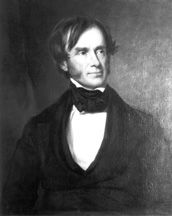 ARCHER, William Segar, second cousin once removed of Thomas Jefferson, a Representative and a Senator from Virginia; born at 'The Lodge,' Amelia County, Va., March 5, 1789; received private instruction; was graduated from William and Mary College, Williamsburg, Va., in 1806; studied law; was admitted to the bar in 1810 and practiced in Amelia and Powhatan Counties; served four terms in the State house of delegates between 1812 and 1819; elected to the Sixteenth Congress to fill the vacancy caused by the resignation of James Pleasants; reelected to the Seventeenth and to the six succeeding Congresses (January 3, 1820-March 3, 1835); unsuccessful candidate for reelection in 1834 to the Twenty-fourth Congress; chairman, Committee on Foreign Affairs (Twenty-first through Twenty-third Congresses); elected as a Whig to the United States Senate and served from March 4, 1841, to March 3, 1847; unsuccessful candidate for reelection in 1846; chairman, Committee on Foreign Relations (Twenty-seventh and Twenty-eighth Congresses), Committee on Naval Affairs (Twenty-seventh Congress); resumed the practice of law; died at 'The Lodge,' in Amelia County, Va., March 28, 1855; interment in a private cemetery at 'The Lodge.'
ARCHER, William Segar, second cousin once removed of Thomas Jefferson, a Representative and a Senator from Virginia; born at 'The Lodge,' Amelia County, Va., March 5, 1789; received private instruction; was graduated from William and Mary College, Williamsburg, Va., in 1806; studied law; was admitted to the bar in 1810 and practiced in Amelia and Powhatan Counties; served four terms in the State house of delegates between 1812 and 1819; elected to the Sixteenth Congress to fill the vacancy caused by the resignation of James Pleasants; reelected to the Seventeenth and to the six succeeding Congresses (January 3, 1820-March 3, 1835); unsuccessful candidate for reelection in 1834 to the Twenty-fourth Congress; chairman, Committee on Foreign Affairs (Twenty-first through Twenty-third Congresses); elected as a Whig to the United States Senate and served from March 4, 1841, to March 3, 1847; unsuccessful candidate for reelection in 1846; chairman, Committee on Foreign Relations (Twenty-seventh and Twenty-eighth Congresses), Committee on Naval Affairs (Twenty-seventh Congress); resumed the practice of law; died at 'The Lodge,' in Amelia County, Va., March 28, 1855; interment in a private cemetery at 'The Lodge.'

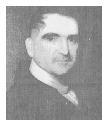 BARBOUR, James, a Senator from Virginia; born at 'Frascati,' near Gordonsville, Orange County, Va., June 10, 1775; attended the common schools; deputy sheriff of Orange County; studied law; was admitted to the bar in 1794 at Orange Court House; served several terms in the Virginia house of delegates between 1796 and 1812, serving as speaker from 1809 to 1812; Governor of Virginia 1812-1814; elected as an Anti-Democrat and State Rights candidate to the United States Senate in 1814 for the term commencing March 4, 1815; subsequently elected to fill the vacancy in the term ending March 3, 1815, caused by the death of Richard Brent; reelected in 1821 and served from January 2, 1815, to March 7, 1825, when he resigned to accept a Cabinet portfolio; served as President pro tempore of the Senate during the Fifteenth and Sixteenth Congresses; chairman, Committee on Foreign Relations (Fifteenth, Sixteenth, and Eighteenth Congresses), Committee on the District of Columbia (Seventeenth Congress); appointed Secretary of War by President John Quincy Adams and served from March 7, 1825, to May 26, 1828, when he resigned to accept a diplomatic position; United States Minister to England from May 26, 1828, to September 23, 1829; chairman of the Whig National Convention in 1839; founder of the Orange County Humane Society, established for the advancement of education; died in Barboursville, Orange County, Va., June 7, 1842; interment in the family cemetery.
BARBOUR, James, a Senator from Virginia; born at 'Frascati,' near Gordonsville, Orange County, Va., June 10, 1775; attended the common schools; deputy sheriff of Orange County; studied law; was admitted to the bar in 1794 at Orange Court House; served several terms in the Virginia house of delegates between 1796 and 1812, serving as speaker from 1809 to 1812; Governor of Virginia 1812-1814; elected as an Anti-Democrat and State Rights candidate to the United States Senate in 1814 for the term commencing March 4, 1815; subsequently elected to fill the vacancy in the term ending March 3, 1815, caused by the death of Richard Brent; reelected in 1821 and served from January 2, 1815, to March 7, 1825, when he resigned to accept a Cabinet portfolio; served as President pro tempore of the Senate during the Fifteenth and Sixteenth Congresses; chairman, Committee on Foreign Relations (Fifteenth, Sixteenth, and Eighteenth Congresses), Committee on the District of Columbia (Seventeenth Congress); appointed Secretary of War by President John Quincy Adams and served from March 7, 1825, to May 26, 1828, when he resigned to accept a diplomatic position; United States Minister to England from May 26, 1828, to September 23, 1829; chairman of the Whig National Convention in 1839; founder of the Orange County Humane Society, established for the advancement of education; died in Barboursville, Orange County, Va., June 7, 1842; interment in the family cemetery.

BROCKENBROUGH, William, Judge of the Virginia Superior Court, long distinguished in public life; second son of Dr. John Brockenbrough and Sarah Roane Brockenbrough; born July 10, 1778 in Essex, Virginia. Nephew of Judge Spencer Roane and second cousin of Thomas Ritchey. Represented Essex in the House of Delegates, 1802-1803, appointed member of the Council, May 1803; judge of the General Court, February 7, 1809; In 1815 Judge Brockenbrough and Hugh Holmes published the first of two volumes of reports of cases in the General Court of Virginia, most of which were criminal appeals. (A second volume was published in 1826.) "The General Court had a limited civil jurisdiction, but its primary function was to serve as the court of last resort in criminal matters judge of the Court of Appeals. He was a member of the committee of revisors of the Laws of Virginia, published im 1819. Married Judith Robinson White, 1806. One child, John White Brockenbrough. Died 10 Dec 1838, Richmond, Virginia. (Grayson County, Virginia Superior Court Order Book 1809-1821)
...

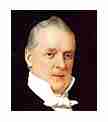 BUCHANAN, James, a Representative and a Senator from Pennsylvania and 15th President of the United States; born at Cove Gap, near Mercersburg, Franklin County, Pa., April 23, 1791; moved to Mercersburg, Pa., with his parents in 1799; was privately tutored and then attended the village academy; was graduated from Dickinson College, Carlisle, Pa., in 1809; moved to Lancaster, Pa., the same year; studied law; was admitted to the bar in 1812 and practiced in Lancaster; was one of the first volunteers in the War of 1812 and served in the defense of Baltimore; member, State house of representatives 1814-1815; elected to the Seventeenth and to the four succeeding Congresses (March 4, 1821-March 3, 1831); chairman, Committee on the Judiciary (Twenty-first Congress); was not a candidate for renomination in 1830; one of the managers appointed by the House of Representatives in 1830 to conduct the impeachment proceedings against James H. Peck, judge of the United States District Court for the District of Missouri; Minister to Russia 1832-1834; elected as a Democrat to the United States Senate to fill the vacancy caused by the resignation of William Wilkins; reelected in 1837 and 1843 and served from December 6, 1834, until he resigned on March 5, 1845, to accept a Cabinet portfolio; chairman, Committee on Foreign Relations (Twenty-fourth through Twenty-sixth Congresses); Secretary of State in the Cabinet of President James Polk 1845-1849; Minister to Great Britain 1853-1856; elected as a Democrat President of the United States in 1856 and served from March 4, 1857, to March 3, 1861; retired to his home 'Wheatland,' near Lancaster, Pa., where he died June 1, 1868; interment in Woodward Hill Cemetery, Lancaster, Pa.
BUCHANAN, James, a Representative and a Senator from Pennsylvania and 15th President of the United States; born at Cove Gap, near Mercersburg, Franklin County, Pa., April 23, 1791; moved to Mercersburg, Pa., with his parents in 1799; was privately tutored and then attended the village academy; was graduated from Dickinson College, Carlisle, Pa., in 1809; moved to Lancaster, Pa., the same year; studied law; was admitted to the bar in 1812 and practiced in Lancaster; was one of the first volunteers in the War of 1812 and served in the defense of Baltimore; member, State house of representatives 1814-1815; elected to the Seventeenth and to the four succeeding Congresses (March 4, 1821-March 3, 1831); chairman, Committee on the Judiciary (Twenty-first Congress); was not a candidate for renomination in 1830; one of the managers appointed by the House of Representatives in 1830 to conduct the impeachment proceedings against James H. Peck, judge of the United States District Court for the District of Missouri; Minister to Russia 1832-1834; elected as a Democrat to the United States Senate to fill the vacancy caused by the resignation of William Wilkins; reelected in 1837 and 1843 and served from December 6, 1834, until he resigned on March 5, 1845, to accept a Cabinet portfolio; chairman, Committee on Foreign Relations (Twenty-fourth through Twenty-sixth Congresses); Secretary of State in the Cabinet of President James Polk 1845-1849; Minister to Great Britain 1853-1856; elected as a Democrat President of the United States in 1856 and served from March 4, 1857, to March 3, 1861; retired to his home 'Wheatland,' near Lancaster, Pa., where he died June 1, 1868; interment in Woodward Hill Cemetery, Lancaster, Pa.

BUCK, Charles N., 1775-1851
In 1818 Charles Buck, Philadelphia merchant, was asked to become the Consul General for the Free and Hanseatic City (Freie und Hansestadt) of Hamburg. He had asked Congress in January if he could have their permission to take the post. Congress sent the question into a committee.
Secretary of State John Quincy Adams responded to him with this letter: [image]
|
21 March
Charles N. Buck Feby 11th
Sir,
The communication of the President to Congress concerning
the ratification of the thirteenth amendment of the Constitution of the
U.S., and to which you allude in your letter to me of the 11th instant,
was not conclusive as to the rejection of that amendment; and it is
still not definitely known at this Dept whether it may not have
been adopted by a sufficient number of states to make it a part
of the law of the land. From this explanation you will readily
comprehend that these circumstances under which your request
has been postponed remains unaltered, and that the expediency
of forwarding it to you is opposed by the same difficulty that
existed prior to the date of your letter.
Upon a return from the Executive of Virginia, for
which an application has been made by this Dept, it will be
known with precision what is the fate of the proposed amendment,
and no time will be lost in communicating it to you.
The President has just sent a message to Congress,
by which you will perceive that the views of the Senate of
Hamburg have not escaped the attention of this Government,
in the matter referred to. The message will probably be
printed with the proceedings of Congress, and appear in the public
prints in a few days. J. Q. A.
|
We can assume from this reply that the committee realized they couldn't promise anything.
Buck did become consul general of Hamburg to the United States.

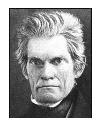 CALHOUN John Caldwell, 1782-1850, Statesman from South Carolina was a formidable presence in American politics for nearly four decades. He served twice as Vice President under John Quincy Adams and Andrew Jackson and in two cabinets. During his years in the Senate, from 1832 to 1843 and again from 1845 until his death, he had his greatest impact as a champion of southern interests and formulator of the states'-rights theory of America's political union. Calhoun is remembered today not only as a protector of the rights of a political minority, but also as a great logician and intellect. John C. Calhoun, Daniel Webster, and Kentucky's Henry Clay were the so-called "Great Triumvirate" of sectional statesmen. Their legislative compromises held the nation together during the tumultuous decades leading to the Civil War. His colleague, northerner Daniel Webster, considered Calhoun the Senate's ablest member and the greatest American in public life of his time.
CALHOUN John Caldwell, 1782-1850, Statesman from South Carolina was a formidable presence in American politics for nearly four decades. He served twice as Vice President under John Quincy Adams and Andrew Jackson and in two cabinets. During his years in the Senate, from 1832 to 1843 and again from 1845 until his death, he had his greatest impact as a champion of southern interests and formulator of the states'-rights theory of America's political union. Calhoun is remembered today not only as a protector of the rights of a political minority, but also as a great logician and intellect. John C. Calhoun, Daniel Webster, and Kentucky's Henry Clay were the so-called "Great Triumvirate" of sectional statesmen. Their legislative compromises held the nation together during the tumultuous decades leading to the Civil War. His colleague, northerner Daniel Webster, considered Calhoun the Senate's ablest member and the greatest American in public life of his time.
He was born near Calhoun Mills, Abbeville District (now Mount Carmel, McCormick County), S.C., March 18, 1782. He attended the common schools and private academies, studing under his brother-in-law, Dr. Moses Waddel, at Carmel Academy, Columbia County, Georgia; was graduated from Yale College in 1804; studied law at Judge Tapping Reeve's school in Litchfield, Connecticut, and continued his study at Charleston, South Carolina, in the office of Henry W. De Saussure; was admitted to the bar in 1807, and commenced practice n Abbeville, S.C. He also engaged in agricultural pursuits.
He was elected a member of State house of representatives 1808-1809. He was elected as a Republican to the Twelfth and to the three succeeding Congresses and served from March 4, 1811, to November 3, 1817, when he resigned. He joined the "war hawks" in recommending a declaration of war against England in 1812. Calhoun was appointed Secretary of War in the Cabinet of President James Monroe 1817-1825. He established the Army's bureau system and formalized the lines of authority between staff and line. He advocated an expansible regular Army in lieu of dependence upon militia and created the position of Commanding General of the Army. He established the Artillery School of Practice, the Army's first postgraduate school and authorized and instituted reforms at West Point.
Calhoun was elected vice president of the United States in 1824 with President John Quincy Adams. He was reelected in 1828 with President Andrew Jackson and served from March 4, 1825, to December 28, 1832, when he resigned. This was precipitated by a dispute with Jackson over states' rights and nullification, and having already been elected to the United States Senate on December 12, 1832, where he served to fill the vacancy caused by the resignation of Robert Y. Hayne. Reelected in 1834 and 1840, he served from December 29, 1832, until his resignation, effective March 3, 1843. He was Appointed Secretary of State in the Cabinet of President John Tyler from 1844-1845. Again elected to the United States Senate to fill the vacancy caused by the resignation of Daniel E. Huger, he was reelected in 1846 and served from November 26, 1845, until his death in Washington, D.C., March 31, 1850; chairman, Committee on Finance (Twenty-ninth Congress). His interment is in St. Philip's Churchyard, Charleston, S.C.

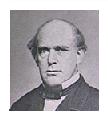 CHASE, Salmon P., was born in 1808 in New Hampshire. His family could trace its American origins to the early years of Massachusetts settlement in the seventeenth century. The eighth of eleven children of a tavernkeeper and local officeholder, Chase received his early education in a local district school and a private institution.
CHASE, Salmon P., was born in 1808 in New Hampshire. His family could trace its American origins to the early years of Massachusetts settlement in the seventeenth century. The eighth of eleven children of a tavernkeeper and local officeholder, Chase received his early education in a local district school and a private institution.
When Chase was nine years old, his father died, and the youth was placed under the care of an uncle, who was the Protestant Episcopal bishop of Ohio. Receiving secular and religious training in Ohio, he enrolled at Cincinnati College where his uncle was president. He remained there only a short time before entering
Dartmouth College, from which he was graduated in 1826. Chase moved to Washington, D.C., where he conducted a school and studied law under the guidance of the prominent politician, William Wirt. He was admitted to the bar in 1829.
Returning to Ohio in 1830, Chase settled in Cincinnati, where he practiced law, entered into antislavery and other reform activities, and engaged in writing and lecturing. His religious and moral impulses led him to defend a number of escaped slaves in local as well as federal courts, including the Supreme Court. Initially a Whig, Chase helped form the antislavery Liberty party, and became one of its leaders. Later, following the Mexican War, he helped form the Free Soil party, which was dedicated to the non-expansion of slavery. A coalition of
Free Soilers and Democrats in Ohio elected Chase to the United States Senate in early 1849, and he used his position to protest measures such as the Compromise of 1850 and the Kansas-Nebraska Act as subversive of freedom and liberty. His "Appeal of the Independent Democrats," following passage of the Kansas-Nebraska
Act, was a classic expression of protest against a slave power conspiracy to nationalize slavery.
When the Republican party began to form in the aftermath of the Kansas-Nebraska Act, Chase was an early proponent. He was elected governor of Ohio in 1855 and 1857, and United States senator in 1860. His long antislavery record and party activism led Chase to be prominently mentioned as a Republican presidential
candidate in both 1856 and 1860. But widespread support failed to materialize, and at the Republican convention in 1860, Ohio cast its lot with Lincoln, placing Chase in a favorable position for a cabinet post when Lincoln was elected. When Lincoln appointed him secretary of the treasury, Chase resigned his Senate seat and served as Treasury secretary from 1861 until July 1864.
As secretary of the treasury, Chase presided over the complex and difficult task of financing the war; he was instrumental in establishing the national banking system in 1863. But his more radical antislavery views, as well as political ambition, put him at odds with the more moderate Lincoln. Eventually, in 1864, Lincoln accepted Chase's resignation because, as Lincoln said, they had reached a point of "mutual embarrassment" in their official relations. Nevertheless, when Supreme Court Chief Justice Roger Taney died in October of that year,
Lincoln appointed Chase to the position. It was he who administered the presidential oath to Andrew Johnson following Lincoln's assassination.
Although an advocate of black suffrage and Radical Reconstruction measures, Chase encountered opposition from the Republican party's radical wing during Johnson's presidency. His handling of the Johnson impeachment proceedings in the Senate brought criticism from radicals, and soon Chase's name was mentioned as a possible 1868 Democratic party presidential nominee. But the nomination went to Horatio Seymour of New York. Meanwhile, as chief justice, Chase presided over a court that actively involved itself in a host of key cases dealing with the Civil War, Reconstruction, and government finance. Deteriorating health put
a halt to further efforts to promote Chase's political prospects, and in 1873, he died of a paralytic stroke.

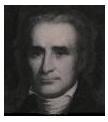 COALTER, John (1750-1837) was for many years Judge of the Supreme Court of Appeals of Virginia, and one of the most prominent men of his day; Chancellor of the law school at College of William and Mary and a revisor of the 1819 VA code. His first wife was Miss Frances Tucker, and by this marriage he had two children, St. George and Elizabeth Tucker. From a letter of President John Tyler to Judge Coalter, "In my recent public course," Tyler explained to his fellow Virginian, "no other motive has governed me but a desire to uphold the Constitution and the laws, and to restrain executive power already grown too great, within the limits which they prescribe." Tyler to John Coalter, May 29, 1834, Tyler Family Papers.
COALTER, John (1750-1837) was for many years Judge of the Supreme Court of Appeals of Virginia, and one of the most prominent men of his day; Chancellor of the law school at College of William and Mary and a revisor of the 1819 VA code. His first wife was Miss Frances Tucker, and by this marriage he had two children, St. George and Elizabeth Tucker. From a letter of President John Tyler to Judge Coalter, "In my recent public course," Tyler explained to his fellow Virginian, "no other motive has governed me but a desire to uphold the Constitution and the laws, and to restrain executive power already grown too great, within the limits which they prescribe." Tyler to John Coalter, May 29, 1834, Tyler Family Papers.

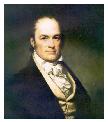 CRAWFORD, William Harris, a Senator from Georgia; born in Nelson County, Va., February 24, 1772; moved with his father to Edgefield District, S.C., in 1779 and to Columbia County, Ga., in 1783; pursued classical studies in a private school and in Richmond Academy, Augusta, Ga.; studied law; was admitted to the bar and commenced practice in Lexington, Ga., in 1799; appointed to prepare a digest of the laws of Georgia in 1799; member, State house of representatives 1803-1807; elected to the United States Senate to fill the vacancy caused by the death of Abraham Baldwin and served from November 7, 1807, to March 23, 1813, when he resigned; served as President pro tempore of the Senate during the Twelfth Congress; declined the portfolio of Secretary of War tendered by President James Madison in 1813; Minister to France 1813-1815; returned home to act as agent for the sale of the land donated by Congress to Lafayette; appointed Secretary of War by President Madison in August 1815; transferred to the Treasury in October 1816, and served under Presidents Madison and James Monroe until 1825; unsuccessful Democratic candidate for President of the United States in 1824; due to illness refused the tender of President John Adams that he remain Secretary of the Treasury; returned to Georgia and was appointed judge of the northern circuit court in 1827, which position he held until his death in Oglethorpe County, Ga., September 15, 1834; interment on his estate, 'Woodlawn,' near Crawford, Oglethorpe County, Ga.
CRAWFORD, William Harris, a Senator from Georgia; born in Nelson County, Va., February 24, 1772; moved with his father to Edgefield District, S.C., in 1779 and to Columbia County, Ga., in 1783; pursued classical studies in a private school and in Richmond Academy, Augusta, Ga.; studied law; was admitted to the bar and commenced practice in Lexington, Ga., in 1799; appointed to prepare a digest of the laws of Georgia in 1799; member, State house of representatives 1803-1807; elected to the United States Senate to fill the vacancy caused by the death of Abraham Baldwin and served from November 7, 1807, to March 23, 1813, when he resigned; served as President pro tempore of the Senate during the Twelfth Congress; declined the portfolio of Secretary of War tendered by President James Madison in 1813; Minister to France 1813-1815; returned home to act as agent for the sale of the land donated by Congress to Lafayette; appointed Secretary of War by President Madison in August 1815; transferred to the Treasury in October 1816, and served under Presidents Madison and James Monroe until 1825; unsuccessful Democratic candidate for President of the United States in 1824; due to illness refused the tender of President John Adams that he remain Secretary of the Treasury; returned to Georgia and was appointed judge of the northern circuit court in 1827, which position he held until his death in Oglethorpe County, Ga., September 15, 1834; interment on his estate, 'Woodlawn,' near Crawford, Oglethorpe County, Ga.

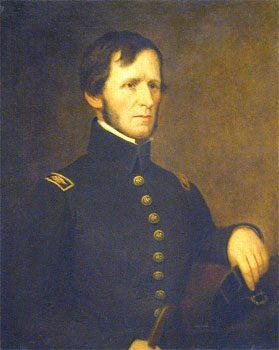 CROSS, Trueman, soldier, born in Maryland; died near the present Fort Brown, Texas, 10 April 1846. He entered the army as ensign in the 42d infantry, 27 April 1814; became assistant deputy quarter-master-general, with the rank of captain, 16 June 1818;
major-quartermaster, 22 May 1826; and assistant quartermaster-general, with the rank of colonel, 7 July 1838. During the Mexican-American War he was chief of the Quartermaster's Department of General Zachary Taylor's Army Of Occupation from 10 October 1845, till his death while out horseback riding, which he met at the hands of Mexican guerillas. Colonel Cross published "Military Laws of the United States - 1825" (Washington), under the authority of Secretary of War John C. Calhoun.
CROSS, Trueman, soldier, born in Maryland; died near the present Fort Brown, Texas, 10 April 1846. He entered the army as ensign in the 42d infantry, 27 April 1814; became assistant deputy quarter-master-general, with the rank of captain, 16 June 1818;
major-quartermaster, 22 May 1826; and assistant quartermaster-general, with the rank of colonel, 7 July 1838. During the Mexican-American War he was chief of the Quartermaster's Department of General Zachary Taylor's Army Of Occupation from 10 October 1845, till his death while out horseback riding, which he met at the hands of Mexican guerillas. Colonel Cross published "Military Laws of the United States - 1825" (Washington), under the authority of Secretary of War John C. Calhoun.
From a military report:
NEAR FORT TEXAS, NORTH BANK OF RIO GRANDE, APRIL 1846.
Killed:
1. Colonel Trueman Cross, Assistant Quartermaster General. Ambushed and murdered by Mexican guerillas, probably on April 10, 1846. Cross' remains were recovered on April 21, 1846. Originally buried outside the walls of Fort Texas on April 26, 1846; reinterred at Washington, D.C. later that same year.
2. 2nd Lt. Theodoric (or Theodore) H. Porter, 4th Infantry.
3. Private Pat Flood, 4th Infantry.
(Both Porter and Flood were ambushed and killed by Mexican guerrillas on the north bank of Rio Grande, April 18, 1846, while searching for the missing Colonel Cross. Their remains were recovered on June 5, 1846.)
May 23, 1846 THE LATE COLONEL CROSS, FIRST VICTIM OF THE WAR
The following general orders were issued by the commander of the "army of occupation" on the occasion of the death and burial of our late lamented and universally beloved fellow citizen, Col. Truman Cross, assistant quartermaster general in the army of the United States:
ORDERS NO 20.
Headquarters, Army of Occupation,
Camp near Matamoros, April 25, 1846.
The commanding general has the painful duty of announcing to the army that the doubt which has so long prevailed in regard to the fate of the late Col. CROSS, has at length, been resolved into the melancholy certainty of his death, and, there is too much reason to fear, by violent hands.
The high rank of the deceased, and the ability and energy which he carried into the discharge of the important duties of his office, will cause his loss to be seriously felt in the service, while the untoward circumstances of his demise will render it particularly afflicting to his family and personal friends.
The remains of the late colonel will be interred, with military honors, at 4 o'clock P.M. to-morrow. The funeral escort will be composed of a squadron of dragoons and eight companies of infantry; the latter to be taken from the 2d brigade, and the whole to be organized and commanded by Colonel Twiggs.
The necessary arrangements for the funeral ceremony will be made by Lieut. Col. Payne, inspector general.
All officers off duty are respectfully invited to attend the funeral. By order of
BRIG. GEN. TAYLOR.

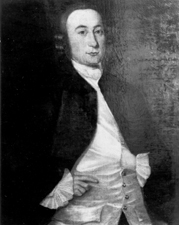 DALTON, Tristram, a Senator from Massachusetts; born in Newburyport, Mass., May 28, 1738; attended Dummer Academy, Byfield, Mass., and was graduated from Harvard College in 1755; studied law; was admitted to the bar but did not practice; engaged in mercantile pursuits; delegate from Massachusetts to the convention of committees of New England Provinces which met in Providence, R.I., December 25, 1776; member, State house of representatives 1782-1785, and served as speaker in 1784; elected to the Continental Congress in 1783 and 1784, but did not attend; member, State senate 1785-1788; elected to the United States Senate and served from March 4, 1789, to March 3, 1791; unsuccessful candidate for reelection in 1790; surveyor of the port of Boston from November 1814 until his death in Boston, Mass., May 30, 1817; interment in the churchyard of St. Paul's Episcopal Church, Newburyport, Essex County, Mass.
DALTON, Tristram, a Senator from Massachusetts; born in Newburyport, Mass., May 28, 1738; attended Dummer Academy, Byfield, Mass., and was graduated from Harvard College in 1755; studied law; was admitted to the bar but did not practice; engaged in mercantile pursuits; delegate from Massachusetts to the convention of committees of New England Provinces which met in Providence, R.I., December 25, 1776; member, State house of representatives 1782-1785, and served as speaker in 1784; elected to the Continental Congress in 1783 and 1784, but did not attend; member, State senate 1785-1788; elected to the United States Senate and served from March 4, 1789, to March 3, 1791; unsuccessful candidate for reelection in 1790; surveyor of the port of Boston from November 1814 until his death in Boston, Mass., May 30, 1817; interment in the churchyard of St. Paul's Episcopal Church, Newburyport, Essex County, Mass.

EDWARDS, Weldon Nathaniel, a Representative from North Carolina; born in Gaston, Northampton County, N.C., January 25, 1788; attended Warrenton Academy; studied law; was admitted to the bar in 1810 and commenced practice in Warrenton, N.C.; member of the State house of representatives in 1814 and 1815; elected as a Republican to the Fourteenth Congress to fill the vacancy caused by the resignation of Nathaniel Macon; reelected to the Fifteenth and to the four succeeding Congresses and served from February 7, 1816, to March 3, 1827; chairman, Committee on Expenditures in the Department of the Treasury (Eighteenth Congress), Committee on Public Expenditures (Nineteenth Congress); declined to be a candidate for reelection in 1826; returned to his plantation; member of the State senate 1833-1844; member of the State constitutional convention in 1835; again elected to the State senate in 1850 and chosen its president; president of the State secession convention in 1861; died in Warren County, N.C., December 18, 1873; interment in a private cemetery at his home, "Poplar Mount," about twelve miles from Warrenton, Warren County, N.C.

FLOYD, John, a Representative from Virginia; born at Floyds Station, near the present city of Louisville, Jefferson County, Ky. (then a part of Virginia), April 24, 1783; pursued an academic course; attended Dickinson College, Carlisle, Pa., and was graduated from the medical department of the University of Pennsylvania at Philadelphia in 1806; settled in Lexington, Va., the same year, and soon thereafter moved to Christiansburg, Montgomery County, Va., where he practiced his profession; justice of the peace in 1807; major of Virginia State Militia 1807-1812; served as surgeon with rank of major in the War of 1812; subsequently became brigadier general of militia; member of the State house of delegates in 1814 and 1815; elected as a Republican to the Fifteenth Congress and reelected to the five succeeding Congresses (March 4, 1817-March 3, 1829); was not a candidate for renomination in 1828; Governor of Virginia 1830-1834; received the electoral vote of South Carolina for President in 1833; died near Sweetsprings, Monroe County, Va. (now West Virginia), August 17, 1837; interment in an unmarked grave in the cemetery at Sweetsprings.

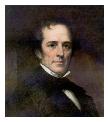 FLOYD, John Buchanan (1806-1863), American politician and Confederate army officer, born in Smithfield, Virginia, and educated at South Carolina College (now University of South Carolina). He married Sally Preston in 1830 and entered the practice of law at
Wytheville, Virginia. He was elected to the Virginia state assembly in 1847 and served as governor of Virginia from 1849 to 1852. For aid in the election of James Buchanan as president of the U.S., Floyd was appointed secretary of war in 1857. He advocated states' rights, but opposed secession. The secession of South Carolina on December 20, 1860, the occupancy of Fort Sumter on December 26, and Buchanan's refusal to order its evacuation turned Floyd into a strong secessionist, and he resigned on December 29. Floyd was persecuted following his withdrawal. Buchanan accused him of misusing $870,000 of government funds, but the government could not sustain the charge. He was also accused of having strengthened the South by transferring arms from northern arsenals, a charge quashed by a congressional committee.
FLOYD, John Buchanan (1806-1863), American politician and Confederate army officer, born in Smithfield, Virginia, and educated at South Carolina College (now University of South Carolina). He married Sally Preston in 1830 and entered the practice of law at
Wytheville, Virginia. He was elected to the Virginia state assembly in 1847 and served as governor of Virginia from 1849 to 1852. For aid in the election of James Buchanan as president of the U.S., Floyd was appointed secretary of war in 1857. He advocated states' rights, but opposed secession. The secession of South Carolina on December 20, 1860, the occupancy of Fort Sumter on December 26, and Buchanan's refusal to order its evacuation turned Floyd into a strong secessionist, and he resigned on December 29. Floyd was persecuted following his withdrawal. Buchanan accused him of misusing $870,000 of government funds, but the government could not sustain the charge. He was also accused of having strengthened the South by transferring arms from northern arsenals, a charge quashed by a congressional committee.
Appointed a brigadier general in the Confederate army in 1861, Floyd was ordered to command Fort Donelson in Tennessee. He arrived there after General Ulysses S. Grant had brought it under siege. Penned within their own lines and outnumbered almost two to one, Floyd and his associates, generals Gideon Pillow and Simon Buckner, were unable to agree on how to defend the fort. Floyd and Pillow, having successively relinquished command, escaped with 1200 men by steamer on the Cumberland River. (Buckner later surrendered the fort.) Confederate president Jefferson Davis stripped Floyd of command for deserting his post, but Floyd was subsequently appointed a major general by the Virginia Assembly.

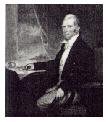 GILES, William Branch, a Representative and a Senator from Virginia; born near
Amelia Court House, Amelia County, Va., August 12, 1762; pursued classical studies and graduated from the College of New Jersey (now Princeton University) in 1781; studied law; was admitted to the bar and practiced in Petersburg, Va., 1784-1789; elected to the First Congress to fill the vacancy caused by the death of Theodorick Bland; reelected to the Second and to the three succeeding Congresses and served from December 7, 1790, to October 2, 1798, when he resigned; member, State house of delegates 1798-1800; elected as a Republican to the Seventh Congress (March 4, 1801-March 3, 1803); appointed to the United States Senate as a Republican to fill the vacancy in the term beginning March 4, 1803, caused by the resignation of Abraham B. Venable; while holding the office of Senator-designate was elected on December 4, 1804, to fill the vacancy in the term beginning March 4, 1799, caused by the resignation of Wilson C. Nicholas; was reelected in 1804 and 1811 and served from August 11, 1804, to March 3, 1815, when he resigned; member, State house of delegates 1816-1817, 1826-1827; unsuccessful candidate for election to the United States Senate in 1825; Governor of Virginia 1827-1830; was a member of the State constitutional convention in 1829 and 1830; again elected Governor in 1830, but declined; died on his estate, 'Wigwam,' near Amelia Court House, Amelia County, Va., December 4, 1830; interment in a private cemetery on his estate.
GILES, William Branch, a Representative and a Senator from Virginia; born near
Amelia Court House, Amelia County, Va., August 12, 1762; pursued classical studies and graduated from the College of New Jersey (now Princeton University) in 1781; studied law; was admitted to the bar and practiced in Petersburg, Va., 1784-1789; elected to the First Congress to fill the vacancy caused by the death of Theodorick Bland; reelected to the Second and to the three succeeding Congresses and served from December 7, 1790, to October 2, 1798, when he resigned; member, State house of delegates 1798-1800; elected as a Republican to the Seventh Congress (March 4, 1801-March 3, 1803); appointed to the United States Senate as a Republican to fill the vacancy in the term beginning March 4, 1803, caused by the resignation of Abraham B. Venable; while holding the office of Senator-designate was elected on December 4, 1804, to fill the vacancy in the term beginning March 4, 1799, caused by the resignation of Wilson C. Nicholas; was reelected in 1804 and 1811 and served from August 11, 1804, to March 3, 1815, when he resigned; member, State house of delegates 1816-1817, 1826-1827; unsuccessful candidate for election to the United States Senate in 1825; Governor of Virginia 1827-1830; was a member of the State constitutional convention in 1829 and 1830; again elected Governor in 1830, but declined; died on his estate, 'Wigwam,' near Amelia Court House, Amelia County, Va., December 4, 1830; interment in a private cemetery on his estate.

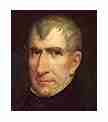 HARRISON, William Henry,HARRISON, William Henry, (son of Benjamin Harrison [1726-1791] a Delegate from the Territory Northwest of the River Ohio, a Representative and a Senator from Ohio, and 9th President of the United States; born on 'Berkeley Plantation,' Charles City County, Va., February 9, 1773; pursued classical studies; attended Hampden-Sidney College, Virginia; studied medicine; entered the Army in 1798 as an ensign in the First Infantry, served in the Indian wars, and rose to the rank of lieutenant; resigning from the Army in 1798, was appointed secretary of the Northwest Territory 1798-1799; elected as a Delegate from the Northwest Territory to the Sixth Congress and served from March 4, 1799, to May 14, 1800, when he resigned to become Territorial Governor of Indiana 1801-1813 and also Indian commissioner; defeated the Indians at Tippecanoe in November 1811; major general in the United States Army in the War of 1812; resigned from the Army in 1814; head commissioner to treat with the Indians; elected to the Fourteenth Congress to fill the vacancy caused by the resignation of John McLean; reelected to the Fifteenth Congress and served from October 8, 1816, to March 3, 1819; member, State senate 1819-1821; elected to the United States Senate and served from March 4, 1825, to May 20, 1828, when he resigned to become Minister to Colombia 1828-1829; chairman, Committee on Military Affairs (Nineteenth and Twentieth Congresses); unsuccessful Whig candidate for president in 1836; elected President of the United States and served from March 4, 1841, until his death in Washington, D.C., April 4, 1841; interment in William Henry Harrison Memorial State Park, opposite Congress Green Cemetery, North Bend, Ohio.
HARRISON, William Henry,HARRISON, William Henry, (son of Benjamin Harrison [1726-1791] a Delegate from the Territory Northwest of the River Ohio, a Representative and a Senator from Ohio, and 9th President of the United States; born on 'Berkeley Plantation,' Charles City County, Va., February 9, 1773; pursued classical studies; attended Hampden-Sidney College, Virginia; studied medicine; entered the Army in 1798 as an ensign in the First Infantry, served in the Indian wars, and rose to the rank of lieutenant; resigning from the Army in 1798, was appointed secretary of the Northwest Territory 1798-1799; elected as a Delegate from the Northwest Territory to the Sixth Congress and served from March 4, 1799, to May 14, 1800, when he resigned to become Territorial Governor of Indiana 1801-1813 and also Indian commissioner; defeated the Indians at Tippecanoe in November 1811; major general in the United States Army in the War of 1812; resigned from the Army in 1814; head commissioner to treat with the Indians; elected to the Fourteenth Congress to fill the vacancy caused by the resignation of John McLean; reelected to the Fifteenth Congress and served from October 8, 1816, to March 3, 1819; member, State senate 1819-1821; elected to the United States Senate and served from March 4, 1825, to May 20, 1828, when he resigned to become Minister to Colombia 1828-1829; chairman, Committee on Military Affairs (Nineteenth and Twentieth Congresses); unsuccessful Whig candidate for president in 1836; elected President of the United States and served from March 4, 1841, until his death in Washington, D.C., April 4, 1841; interment in William Henry Harrison Memorial State Park, opposite Congress Green Cemetery, North Bend, Ohio.

HENING, William Waller, compiler of the The Statutes at Large; Being a Collection of All the Laws of Virginia, From the First Session of the Legislature, in the Year 1619; 13 vols., Richmond, 1809 - 1823 (New York: R & W & G. Bartow, 1823).
During the first 175 years of Virginia lawmaking, no official effort was made to preserve the laws that the General Assembly passed. In the early years, manuscript copies were read at the beginning of monthly court sessions, and legislators spread information on new laws among constituents by word of mouth. A few collections of Virginia laws were printed in London before 1733, when the first printing of laws took place in Virginia. After more than 150 years of lawmaking, it became obvious that courts and lawyers were not always uniform in their application of laws relating to property and other historical issues, such as Indian servitude, because there was no master collection of the "ancient" laws for precedents. Some manuscript copies remained in the hands of the families of former magistrates and some lay rotting in county courthouses.
Thus, in 1795, the General Assembly authorized the publication of laws passed since the beginning of settlement and relating to land and inheritance of property. Thomas Jefferson, who had made a large and important personal collection of Virginia laws dating from 1734, recommended publishing all the old laws that could be found and offered to supervise the work of copying them. He estimated it would take a clerk a year or more to copy them all and felt that three people could work about a day a week collating the manuscripts.
Not until 1808 did the General Assembly decide to tackle the project, with William Waller Hening in charge. Hening's thirteen volumes were published in the early 1820s, covering all the laws that could be found in manuscript or printed form, dating from 1619 (the date of the first General Assembly) to 1792. The effort was indebted to Jefferson's collection and preservation of many of the early laws.
In addition to statutes, Hening chose to include in the first volume other historically significant documents, such as the Declaration of Independence, the Articles of Confederation, the Constitution, Virginia's Declaration of Rights, the Constitution of Virginia, and the royal charters for settlement. Hening obtained the full original Virginia charter texts from William Stith, The History of the First Discovery and Settlement of Virginia (Williamsburg, Printed by William Parks, 1747).

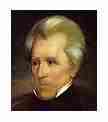 JACKSON, Andrew, a Representative and a Senator from Tennessee and 7th President of the United States; born on March 15, 1767; in the Waxhaw Settlement in South Carolina; attended an old-field school; though just a boy, participated in the battle of Hanging Rock during the Revolution, was captured by the British and imprisoned; worked for a time in a saddler's shop and afterward taught school; studied law in Salisbury, N.C.; was admitted to the bar in 1787; moved to Jonesboro (now Tennessee) in 1788 and commenced practice; appointed solicitor of the western district of North Carolina, comprising what is now the State of Tennessee, in 1788; held the same position in the territorial government of Tennessee after 1791; delegate to the convention to frame a constitution for the new State 1796; upon the admission of Tennessee as a State into the Union was elected to the Fourth and Fifth Congresses and served from December 5, 1796, until his resignation in September 1797; elected as a Republican in September 1797 to the United States Senate for the term that had commenced March 4, 1797, and served from September 26, 1797, until his resignation in April 1798; judge of the State supreme court of Tennessee 1798-1804; engaged in planting and in mercantile pursuits; served in the Creek War of 1813 as commander of Tennessee forces; his victory in the Creek War brought him a commission as major general in the United States Army in May 1814; led his army to victory over the British in the Battle of New Orleans in January 1815; received the thanks of Congress and a gold medal by resolution of February 27, 1815; commanded an expedition which captured Florida in 1817; served as Governor of the new territory in 1821; again elected to the United States Senate and served from March 4, 1823, to October 14, 1825, when he resigned; chairman, Committee on Military Affairs Eighteenth Congress); unsuccessful candidate for President in 1824; elected as a Democrat President of the United States in 1828; reelected in 1832 and served from March 4, 1829, to March 3, 1837; retired to his country home, the 'Hermitage,' near Nashville, Tenn., where he died June 8, 1845; interment in the garden on his estate.
JACKSON, Andrew, a Representative and a Senator from Tennessee and 7th President of the United States; born on March 15, 1767; in the Waxhaw Settlement in South Carolina; attended an old-field school; though just a boy, participated in the battle of Hanging Rock during the Revolution, was captured by the British and imprisoned; worked for a time in a saddler's shop and afterward taught school; studied law in Salisbury, N.C.; was admitted to the bar in 1787; moved to Jonesboro (now Tennessee) in 1788 and commenced practice; appointed solicitor of the western district of North Carolina, comprising what is now the State of Tennessee, in 1788; held the same position in the territorial government of Tennessee after 1791; delegate to the convention to frame a constitution for the new State 1796; upon the admission of Tennessee as a State into the Union was elected to the Fourth and Fifth Congresses and served from December 5, 1796, until his resignation in September 1797; elected as a Republican in September 1797 to the United States Senate for the term that had commenced March 4, 1797, and served from September 26, 1797, until his resignation in April 1798; judge of the State supreme court of Tennessee 1798-1804; engaged in planting and in mercantile pursuits; served in the Creek War of 1813 as commander of Tennessee forces; his victory in the Creek War brought him a commission as major general in the United States Army in May 1814; led his army to victory over the British in the Battle of New Orleans in January 1815; received the thanks of Congress and a gold medal by resolution of February 27, 1815; commanded an expedition which captured Florida in 1817; served as Governor of the new territory in 1821; again elected to the United States Senate and served from March 4, 1823, to October 14, 1825, when he resigned; chairman, Committee on Military Affairs Eighteenth Congress); unsuccessful candidate for President in 1824; elected as a Democrat President of the United States in 1828; reelected in 1832 and served from March 4, 1829, to March 3, 1837; retired to his country home, the 'Hermitage,' near Nashville, Tenn., where he died June 8, 1845; interment in the garden on his estate.

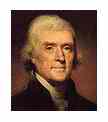 JEFFERSON, Thomas, a Delegate from Virginia and a Vice President and 3d President of the United States; born at 'Shadwell,' Va., in present-day Albemarle County, Va., on April 13 (Gregorian calendar), 1743; attended a preparatory school; graduated from William and Mary College, Williamsburg, Va., in 1762; studied law; was admitted to the bar and commenced practice in 1767; member, colonial House of Burgesses 1769-1775; prominent in pre-Revolutionary movements; Member of the Continental Congress in 1775 and 1776; chairman of the committee that drew up the Declaration of Independence in the summer of 1776 and made the first draft; signer of the Declaration of Independence; resigned soon after and returned to his estate, 'Monticello'; Governor of Virginia 1779-1781; member, State house of delegates 1782; again a Member of the Continental Congress 1783-1784; appointed a Minister Plenipotentiary to France in 1784, and then sole Minister to the King of France in 1785, for three years; Secretary of State of the United States in the Cabinet of President George Washington 1789-1793; elected Vice President of the United States and served under President John Adams 1797-1801; elected President of the United States in 1801 by the House of Representatives on the thirty-sixth ballot; reelected in 1805 and served from March 4, 1801, to March 3, 1809; retired to his estate, 'Monticello,' in Virginia; active in founding the University of Virginia at Charlottesville; died at 'Monticello,' Albemarle County, Va., July 4, 1826; interment in the grounds of 'Monticello.'
JEFFERSON, Thomas, a Delegate from Virginia and a Vice President and 3d President of the United States; born at 'Shadwell,' Va., in present-day Albemarle County, Va., on April 13 (Gregorian calendar), 1743; attended a preparatory school; graduated from William and Mary College, Williamsburg, Va., in 1762; studied law; was admitted to the bar and commenced practice in 1767; member, colonial House of Burgesses 1769-1775; prominent in pre-Revolutionary movements; Member of the Continental Congress in 1775 and 1776; chairman of the committee that drew up the Declaration of Independence in the summer of 1776 and made the first draft; signer of the Declaration of Independence; resigned soon after and returned to his estate, 'Monticello'; Governor of Virginia 1779-1781; member, State house of delegates 1782; again a Member of the Continental Congress 1783-1784; appointed a Minister Plenipotentiary to France in 1784, and then sole Minister to the King of France in 1785, for three years; Secretary of State of the United States in the Cabinet of President George Washington 1789-1793; elected Vice President of the United States and served under President John Adams 1797-1801; elected President of the United States in 1801 by the House of Representatives on the thirty-sixth ballot; reelected in 1805 and served from March 4, 1801, to March 3, 1809; retired to his estate, 'Monticello,' in Virginia; active in founding the University of Virginia at Charlottesville; died at 'Monticello,' Albemarle County, Va., July 4, 1826; interment in the grounds of 'Monticello.'

JOHNSON, Francis, a Representative from Kentucky; born in Caroline County, Va., June 19, 1776; pursued preparatory studies; studied law; was admitted to the bar and practiced; moved to Woodford County, Ky., in 1796 and to Bowling Green in 1807; member of the State house of representatives in 1812, 1813, and 1815; elected to the Sixteenth Congress to fill the vacancy caused by the death of David Walker; reelected to the Seventeenth, Eighteenth, and Nineteenth Congresses and served from November 13, 1820, to March 3, 1827; chairman, Committee on the Post Office and Post Roads (Seventeenth and Eighteenth Congresses); moved to Louisville, Ky., in 1829 and resumed the practice of law; served as Commonwealth attorney for the fifth district; unsuccessful Republican candidate for Governor; died in Louisville, Ky., May 16, 1842; interment in the old family burial ground, later a municipal playground.

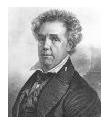 JOHNSON, Richard Mentor, a Representative and a Senator from Kentucky and a Vice President of the United States; born at 'Beargrass,' Jefferson County, Ky., near the present site of Louisville, October 17, 1780; attended the common schools and Transylvania University, Lexington, Ky.; studied law; was admitted to the bar in 1802 and commenced practice in Great Crossings, Ky.; member, State house of representatives 1804-1806 and again in 1819; elected as a Republican to the Tenth and to the five succeeding Congresses (March 4, 1807-March 3, 1819); chairman, Committee on Claims (Eleventh Congress), Committee on Expenditures in the Department of War (Fifteenth Congress); commissioned colonel of Kentucky Volunteers and commanded a regiment in engagements against the British in lower Canada in 1813; elected to the United States Senate to fill the vacancy caused by the resignation of John J. Crittenden; reelected and served from December 10, 1819, to March 3, 1829; unsuccessful candidate for reelection in 1829; chairman, Committee on Post Office and Post Roads (Nineteenth and Twentieth Congresses); elected to the Twenty-first and to the three succeeding Congresses (March 4, 1829-March 3, 1837); chairman, Committee on Post Office and Post Roads (Twenty-first and Twenty-second Congresses), Committee on Military Affairs (Twenty-second through Twenty-fourth Congresses); was chosen Vice President of the United States by the Senate on February 8, 1837, no candidate having received a majority of the electoral vote, and served under President Martin Van Buren from March 4, 1837, to March 3, 1841; member, State house of representatives 1850; died in Frankfort, Ky., November 19, 1850; interment in the Frankfort Cemetery.
JOHNSON, Richard Mentor, a Representative and a Senator from Kentucky and a Vice President of the United States; born at 'Beargrass,' Jefferson County, Ky., near the present site of Louisville, October 17, 1780; attended the common schools and Transylvania University, Lexington, Ky.; studied law; was admitted to the bar in 1802 and commenced practice in Great Crossings, Ky.; member, State house of representatives 1804-1806 and again in 1819; elected as a Republican to the Tenth and to the five succeeding Congresses (March 4, 1807-March 3, 1819); chairman, Committee on Claims (Eleventh Congress), Committee on Expenditures in the Department of War (Fifteenth Congress); commissioned colonel of Kentucky Volunteers and commanded a regiment in engagements against the British in lower Canada in 1813; elected to the United States Senate to fill the vacancy caused by the resignation of John J. Crittenden; reelected and served from December 10, 1819, to March 3, 1829; unsuccessful candidate for reelection in 1829; chairman, Committee on Post Office and Post Roads (Nineteenth and Twentieth Congresses); elected to the Twenty-first and to the three succeeding Congresses (March 4, 1829-March 3, 1837); chairman, Committee on Post Office and Post Roads (Twenty-first and Twenty-second Congresses), Committee on Military Affairs (Twenty-second through Twenty-fourth Congresses); was chosen Vice President of the United States by the Senate on February 8, 1837, no candidate having received a majority of the electoral vote, and served under President Martin Van Buren from March 4, 1837, to March 3, 1841; member, State house of representatives 1850; died in Frankfort, Ky., November 19, 1850; interment in the Frankfort Cemetery.

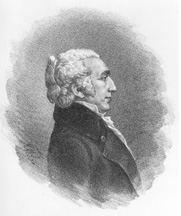 LEIB, Michael, a Representative and a Senator from Pennsylvania; born in Philadelphia, Pa., January 8, 1760; attended the common schools; studied medicine and commenced practice in Philadelphia, Pa.; commissioned surgeon in the Philadelphia Militia in 1780, and served throughout the Revolutionary War; resumed the practice of medicine and served on the staff of several Philadelphia hospitals; member of the committee of correspondence in 1793; member of the State house of representatives 1795-1798; elected to the Sixth and to the three succeeding Congresses and served from March 4, 1799, until February 14, 1806, when he resigned; member, State house of representatives 1806-1808; brigadier general of the Philadelphia Militia 1807-1811; member of the committee of correspondence on the Chesapeake affair, June 1807; elected as a Republican to the United States Senate in 1808 for the term beginning March 4, 1809; subsequently elected to fill the vacancy in the term ending March 3, 1809, caused by the resignation of Samuel Maclay and served from January 9, 1809, to February 14, 1814, when he resigned, having been appointed postmaster of Philadelphia; served as postmaster until 1815; member, the State house of representatives 1817-1818, and the State senate 1818-1821; appointed as a prothonotary of the United States district court at Philadelphia and served from November 1822, until his death in Philadelphia, Pa., on December 8, 1822; interment in St. John's Lutheran Churchyard, Northern Liberties, Philadelphia, Pa.
LEIB, Michael, a Representative and a Senator from Pennsylvania; born in Philadelphia, Pa., January 8, 1760; attended the common schools; studied medicine and commenced practice in Philadelphia, Pa.; commissioned surgeon in the Philadelphia Militia in 1780, and served throughout the Revolutionary War; resumed the practice of medicine and served on the staff of several Philadelphia hospitals; member of the committee of correspondence in 1793; member of the State house of representatives 1795-1798; elected to the Sixth and to the three succeeding Congresses and served from March 4, 1799, until February 14, 1806, when he resigned; member, State house of representatives 1806-1808; brigadier general of the Philadelphia Militia 1807-1811; member of the committee of correspondence on the Chesapeake affair, June 1807; elected as a Republican to the United States Senate in 1808 for the term beginning March 4, 1809; subsequently elected to fill the vacancy in the term ending March 3, 1809, caused by the resignation of Samuel Maclay and served from January 9, 1809, to February 14, 1814, when he resigned, having been appointed postmaster of Philadelphia; served as postmaster until 1815; member, the State house of representatives 1817-1818, and the State senate 1818-1821; appointed as a prothonotary of the United States district court at Philadelphia and served from November 1822, until his death in Philadelphia, Pa., on December 8, 1822; interment in St. John's Lutheran Churchyard, Northern Liberties, Philadelphia, Pa.

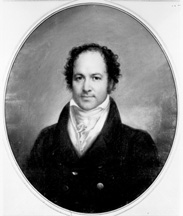 LEIGH, Benjamin Watkins, a Senator from Virginia; born in Chesterfield County, Va., on June 18, 1781; studied under private tutors; graduated from William and Mary College, Williamsburg, Va., in 1802; studied law; was admitted to the bar and commenced practice in Petersburg, Va.; served in the War of 1812; member, State house of delegates 1811-1813; where in 1811 he presented resolutions asserting the right of the legislature to instruct United States senators elected by it; moved to Richmond, Va., in 1813; prepared the Virginia Revised Code of 1819; delegate to the State constitutional convention of 1829 and 1830; member, State house of delegates 1830-1831; official reporter of the State court of appeals 1829-1841; elected as a Whig to the United States Senate to fill the vacancy in the term ending March 3, 1835, caused by the resignation of William C. Rives; reelected in 1835 and served from February 26, 1834, to July 4, 1836, when he resigned; resuming the practice of law. He was the compiler of "Reports of the Court of Appeals and General Court", 1829-1841. The degree of Doctor of Laws by the College of William and Mary, 1837. He died in Richmond, Va., February 2, 1849; interment in Shockoe Cemetery. [Click for more biographical background]
LEIGH, Benjamin Watkins, a Senator from Virginia; born in Chesterfield County, Va., on June 18, 1781; studied under private tutors; graduated from William and Mary College, Williamsburg, Va., in 1802; studied law; was admitted to the bar and commenced practice in Petersburg, Va.; served in the War of 1812; member, State house of delegates 1811-1813; where in 1811 he presented resolutions asserting the right of the legislature to instruct United States senators elected by it; moved to Richmond, Va., in 1813; prepared the Virginia Revised Code of 1819; delegate to the State constitutional convention of 1829 and 1830; member, State house of delegates 1830-1831; official reporter of the State court of appeals 1829-1841; elected as a Whig to the United States Senate to fill the vacancy in the term ending March 3, 1835, caused by the resignation of William C. Rives; reelected in 1835 and served from February 26, 1834, to July 4, 1836, when he resigned; resuming the practice of law. He was the compiler of "Reports of the Court of Appeals and General Court", 1829-1841. The degree of Doctor of Laws by the College of William and Mary, 1837. He died in Richmond, Va., February 2, 1849; interment in Shockoe Cemetery. [Click for more biographical background]

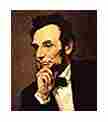 LINCOLN, Abraham, a Representative from Illinois and 16th President of the United States; born in Hardin County, Ky., February 12, 1809; moved with his parents to a tract on Little Pigeon Creek, Ind., in 1816; attended a log-cabin school at short intervals and was self-instructed in elementary branches; moved with his father to Macon County, Ill., in 1830 and later to Coles County, Ill.; read the principles of law and works on surveying; during the Black Hawk War he volunteered in a company of Sangamon County Rifles organized April 21, 1832; was elected its captain and served until May 27 following, when the company was mustered out of service; reenlisted as a private and served until mustered out June 16, 1832; returned to New Salem, Ill., and was unsuccessful as a candidate for the State house of representatives; entered business as a general merchant in New Salem; postmaster of New Salem 1833-1836; deputy county surveyor 1834-1836; elected a member of the State house of representatives in 1834, 1836, 1838, and 1840; declined to be a candidate for renomination; was admitted to the bar in 1836; moved to Springfield, Ill., in 1837 and engaged in the practice of law; elected as a Whig to the Thirtieth Congress (March 4, 1847-March 3, 1849); did not seek a renomination in 1848; an unsuccessful applicant for Commissioner of the General Land Office under President Taylor; tendered the Governorship of Oregon Territory, but declined; unsuccessful Whig candidate for election to the United States Senate before the legislature of 1855; unsuccessful Republican candidate for the United States Senate in 1858; elected as a Republican President of the United States in 1860; reelected in 1864 and served from March 4, 1861, until his death; assassinated in Washington, D.C., April 14, 1865, and died the following day; interment in Oak Ridge Cemetery, Springfield, Ill.
LINCOLN, Abraham, a Representative from Illinois and 16th President of the United States; born in Hardin County, Ky., February 12, 1809; moved with his parents to a tract on Little Pigeon Creek, Ind., in 1816; attended a log-cabin school at short intervals and was self-instructed in elementary branches; moved with his father to Macon County, Ill., in 1830 and later to Coles County, Ill.; read the principles of law and works on surveying; during the Black Hawk War he volunteered in a company of Sangamon County Rifles organized April 21, 1832; was elected its captain and served until May 27 following, when the company was mustered out of service; reenlisted as a private and served until mustered out June 16, 1832; returned to New Salem, Ill., and was unsuccessful as a candidate for the State house of representatives; entered business as a general merchant in New Salem; postmaster of New Salem 1833-1836; deputy county surveyor 1834-1836; elected a member of the State house of representatives in 1834, 1836, 1838, and 1840; declined to be a candidate for renomination; was admitted to the bar in 1836; moved to Springfield, Ill., in 1837 and engaged in the practice of law; elected as a Whig to the Thirtieth Congress (March 4, 1847-March 3, 1849); did not seek a renomination in 1848; an unsuccessful applicant for Commissioner of the General Land Office under President Taylor; tendered the Governorship of Oregon Territory, but declined; unsuccessful Whig candidate for election to the United States Senate before the legislature of 1855; unsuccessful Republican candidate for the United States Senate in 1858; elected as a Republican President of the United States in 1860; reelected in 1864 and served from March 4, 1861, until his death; assassinated in Washington, D.C., April 14, 1865, and died the following day; interment in Oak Ridge Cemetery, Springfield, Ill.

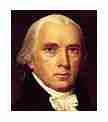 MADISON, James, a Delegate and a Representative from Virginia and 4th President of the United States; born in Port Conway, King George County, Va., March 16, 1751; studied under private tutors and was graduated from Princeton College in 1771; member of the committee of safety from Orange County in 1774; delegate in the Williamsburg (Va.) convention of May 1776; member of the First General Assembly of Virginia in 1776 and was unanimously elected a member of the executive council in 1778; Member of the Continental Congress 1780-1783 and 1787-1788; delegate in the Federal Constitutional Convention at Philadelphia, Pa., in 1787; elected to the First Congress; reelected to the Second and Third Congresses and reelected as a Republican to the Fourth Congress (March 4, 1789-March 3, 1797); declined the mission to France, tendered by President Washington in 1794 and also the position of Secretary of State, tendered the same year; again a member of the Virginia Assembly from Orange County in 1799; appointed by President Jefferson as Secretary of State March 5, 1801; entered upon the duties of that office May 2, 1801, and served until March 4, 1809; elected President of the United States in 1808; reelected in 1812 and served from March 4, 1809, to March 3, 1817; retired to his estate, "Montpelier," Orange County, Va.; delegate in the Virginia constitutional convention of 1829; rector of the University of Virginia at Charlottesville and visitor to the College of William and Mary, Williamsburg, Va.; died in the Montpelier mansion, Orange County, Va., June 28, 1836; interment in the private cemetery on the grounds at "Montpelier."
MADISON, James, a Delegate and a Representative from Virginia and 4th President of the United States; born in Port Conway, King George County, Va., March 16, 1751; studied under private tutors and was graduated from Princeton College in 1771; member of the committee of safety from Orange County in 1774; delegate in the Williamsburg (Va.) convention of May 1776; member of the First General Assembly of Virginia in 1776 and was unanimously elected a member of the executive council in 1778; Member of the Continental Congress 1780-1783 and 1787-1788; delegate in the Federal Constitutional Convention at Philadelphia, Pa., in 1787; elected to the First Congress; reelected to the Second and Third Congresses and reelected as a Republican to the Fourth Congress (March 4, 1789-March 3, 1797); declined the mission to France, tendered by President Washington in 1794 and also the position of Secretary of State, tendered the same year; again a member of the Virginia Assembly from Orange County in 1799; appointed by President Jefferson as Secretary of State March 5, 1801; entered upon the duties of that office May 2, 1801, and served until March 4, 1809; elected President of the United States in 1808; reelected in 1812 and served from March 4, 1809, to March 3, 1817; retired to his estate, "Montpelier," Orange County, Va.; delegate in the Virginia constitutional convention of 1829; rector of the University of Virginia at Charlottesville and visitor to the College of William and Mary, Williamsburg, Va.; died in the Montpelier mansion, Orange County, Va., June 28, 1836; interment in the private cemetery on the grounds at "Montpelier."

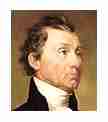 MONROE, James, a Delegate and a Senator from Virginia and 5th President of the United States; born in Westmoreland County, Va., April 28, 1758; pursued classical studies; attended William and Mary College, Williamsburg, Va., in 1776 and left to enter the Continental Army in the Revolutionary War; appointed a lieutenant in the Third Virginia Regiment, participated in numerous engagements, and was severely wounded in the Battle of Harlem Heights; rose to the rank of lieutenant colonel; member, State assembly 1782; Member of the Continental Congress 1783-1786; resumed the study of law; was admitted to the bar and engaged in practice in Fredericksburg, Va.; member, State assembly 1786; delegate to the State convention to consider the Federal Constitution in 1788; unsuccessful candidate for election to the First Congress; elected to the United States Senate to fill the vacancy caused by the death of William Grayson; reelected in 1791 and served from November 9, 1790, until his resignation May 27, 1794; appointed by President George Washington as Minister Plenipotentiary to France 1794-1796; Governor of Virginia 1799-1802; appointed by President Thomas Jefferson as Minister Plenipotentiary to France in 1803, and Minister Plenipotentiary to England 1803-1807, and during this period headed a diplomatic mission to Spain; returned home in 1808; member, State assembly 1810-1811; Governor of Virginia 1811; appointed Secretary of State in the Cabinet of President James Madison and served from 1811 to 1817; also served as Secretary of War 1814-1815; elected and reelected President of the United States and served from March 4, 1817, to March 3, 1825; retired to his farm in Loudoun County, Va.; member and president of the Virginia constitutional convention of 1829; moved to New York City in 1831, and died there July 4, 1831; interment in Marble Cemetery on Second Street, New York City; reinterred in Hollywood Cemetery, Richmond, Va., July 4, 1858.
MONROE, James, a Delegate and a Senator from Virginia and 5th President of the United States; born in Westmoreland County, Va., April 28, 1758; pursued classical studies; attended William and Mary College, Williamsburg, Va., in 1776 and left to enter the Continental Army in the Revolutionary War; appointed a lieutenant in the Third Virginia Regiment, participated in numerous engagements, and was severely wounded in the Battle of Harlem Heights; rose to the rank of lieutenant colonel; member, State assembly 1782; Member of the Continental Congress 1783-1786; resumed the study of law; was admitted to the bar and engaged in practice in Fredericksburg, Va.; member, State assembly 1786; delegate to the State convention to consider the Federal Constitution in 1788; unsuccessful candidate for election to the First Congress; elected to the United States Senate to fill the vacancy caused by the death of William Grayson; reelected in 1791 and served from November 9, 1790, until his resignation May 27, 1794; appointed by President George Washington as Minister Plenipotentiary to France 1794-1796; Governor of Virginia 1799-1802; appointed by President Thomas Jefferson as Minister Plenipotentiary to France in 1803, and Minister Plenipotentiary to England 1803-1807, and during this period headed a diplomatic mission to Spain; returned home in 1808; member, State assembly 1810-1811; Governor of Virginia 1811; appointed Secretary of State in the Cabinet of President James Madison and served from 1811 to 1817; also served as Secretary of War 1814-1815; elected and reelected President of the United States and served from March 4, 1817, to March 3, 1825; retired to his farm in Loudoun County, Va.; member and president of the Virginia constitutional convention of 1829; moved to New York City in 1831, and died there July 4, 1831; interment in Marble Cemetery on Second Street, New York City; reinterred in Hollywood Cemetery, Richmond, Va., July 4, 1858.

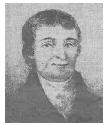 MUNFORD, William, (1775-1825), educated at the College of William and Mary, and like Jefferson, was a student of law in the late 1780s under George Wythe, boarding in his home as was the custom. "Nothing would advance me faster in the world," wrote the young law student Munford, "than the reputation of having been educated by Mr. Wythe, for such a man as he casts a light upon all around him."
MUNFORD, William, (1775-1825), educated at the College of William and Mary, and like Jefferson, was a student of law in the late 1780s under George Wythe, boarding in his home as was the custom. "Nothing would advance me faster in the world," wrote the young law student Munford, "than the reputation of having been educated by Mr. Wythe, for such a man as he casts a light upon all around him."
Munford was the son of Robert and Anne (Beverley) Munford, born at Richlands, Mecklenburg County, Va., August 15, 1775. He was a member of the House of Delegates, 1797-98 and 1800-02; State Senate, 1802-06; and Privy Council before he was elected Clerk of the House of Delegates in 1811, which position he retained for the remainder of his life. While he was Clerk of the House, the Speakers were James Barbour, Andrew Stevenson, Robert Stanard, and Linn Banks. He was also for several years the reporter of the decisions of the Supreme Court of Appeals of Virginia, of which four volumes (1806-09) were prepared in conjunction with William W. Hening, and six volumes (1810-20) were from his own pen. In 1819, he assisted in revising the statute laws of Virginia. He was also the author of an early volume of poems and other literary work (Richmond, 1798), including a translation of the "Iliad" into blank verse, which was published in 1846. In 1806, he delivered a eulogy on his friend, Chancellor Wythe, in the Capitol at Richmond.
Unlike many present-day judges, who pluck their decisions from the nebulous regions of "public policy" and popular opinion, Wythe based his decisions on past precedent and a close reading of the state constitution. In the Commonwealth vs. Caton case of 1782, Wythe wrote that "if the whole legislature, an event to be deprecated, should attempt to overlap the bounds, prescribed to them by the people, I, in administering the public justice of the country, will meet the united powers at my seat in this tribunal; and, pointing to the Constitution, will say to them, here is the limit of your authority; and hither shall you go, but no further."
Munford, whose education Wythe had graciously subsidized, was recognized as one of the most prominent legal scholars of his time. He named a son after his mentor. He died in Richmond, Va., June 21, 1825, and is buried in Shockoe Cemetery, Richmond, Va.

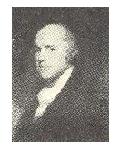 NICHOLAS, Wilson Cary, (brother of John Nicholas and uncle of Robert Carter Nicholas), a Senator and a Representative from Virginia; born in Williamsburg, Va., January 31, 1761; attended the College of William and Mary, Williamsburg, Va.; served in the Revolutionary Army and commanded George Washington's Life Guard until it disbanded in 1783; member, State house of delegates 1784-1789; delegate to the State constitutional convention which ratified the Federal Constitution in 1788; member, State house of delegates 1794-1800; elected as a Republican to the United States Senate to fill the vacancy caused by the death of Henry Tazewell and served from December 5, 1799, until May 22, 1804, when he resigned to become collector of the port of Norfolk 1804-1807; political advisor and lieutenant to President Jefferson; elected to the Tenth and Eleventh Congresses and served from March 4, 1807, until his resignation November 27, 1809; Governor of Virginia 1814-1817; died at 'Tufton,' near Charlottesville, Va., October 10, 1820; interment in the Jefferson burying ground at 'Monticello,' near Charlottesville.
NICHOLAS, Wilson Cary, (brother of John Nicholas and uncle of Robert Carter Nicholas), a Senator and a Representative from Virginia; born in Williamsburg, Va., January 31, 1761; attended the College of William and Mary, Williamsburg, Va.; served in the Revolutionary Army and commanded George Washington's Life Guard until it disbanded in 1783; member, State house of delegates 1784-1789; delegate to the State constitutional convention which ratified the Federal Constitution in 1788; member, State house of delegates 1794-1800; elected as a Republican to the United States Senate to fill the vacancy caused by the death of Henry Tazewell and served from December 5, 1799, until May 22, 1804, when he resigned to become collector of the port of Norfolk 1804-1807; political advisor and lieutenant to President Jefferson; elected to the Tenth and Eleventh Congresses and served from March 4, 1807, until his resignation November 27, 1809; Governor of Virginia 1814-1817; died at 'Tufton,' near Charlottesville, Va., October 10, 1820; interment in the Jefferson burying ground at 'Monticello,' near Charlottesville.

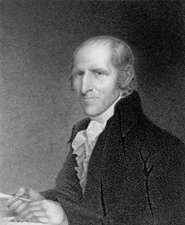 PICKERING, Timothy, a Senator and a Representative from Massachusetts; born in Salem, Mass., July 17, 1745; attended the grammar school and graduated from Harvard College in 1763; clerk in the office of register of deeds in Salem; studied law; was admitted to the bar in 1768 and commenced practice in Salem; selectman and assessor 1772-1777; member of Committee on State of Rights of Colonists 1773; member of Committee of Correspondence and Safety 1774-1775; held various local offices; elected to the State legislature in 1776; entered the Revolutionary Army as colonel; appointed adjutant general and elected as a member of Board of War in 1777; became Quartermaster General of the Army in 1780; moved to Philadelphia in 1785 and to Wyoming County, Pa., in 1787; member of the Pennsylvania State constitutional convention 1789-1790; special government agent on missions to the Indians; appointed Postmaster General in the administration of President George Washington in 1791, as Secretary of War in 1795, and as Secretary of State 1795-1800; returned to Massachusetts in 1802; unsuccessful candidate for election in 1802 to the Eighth Congress; appointed chief justice of court of common pleas and general sessions of the peace in 1802; elected to the United States Senate as a Federalist in 1803 to fill the vacancy caused by the resignation of Dwight Foster; reelected and served from March 4, 1803, to March 3, 1811; unsuccessful candidate for reelection in 1811; censured by the Senate in 1811 for breach of confidence; member of the executive council of Massachusetts 1812-1813; elected as a Federalist to the Thirteenth and Fourteenth Congresses (March 4, 1813-March 3, 1817); declined to be a candidate for renomination; returned to his farm near Wenham, Mass.; returned to Salem in 1820; unsuccessful candidate for election to the Seventeenth Congress; died in Salem, Essex County, Mass., January 29, 1829; interment in Broad Street Cemetery.
PICKERING, Timothy, a Senator and a Representative from Massachusetts; born in Salem, Mass., July 17, 1745; attended the grammar school and graduated from Harvard College in 1763; clerk in the office of register of deeds in Salem; studied law; was admitted to the bar in 1768 and commenced practice in Salem; selectman and assessor 1772-1777; member of Committee on State of Rights of Colonists 1773; member of Committee of Correspondence and Safety 1774-1775; held various local offices; elected to the State legislature in 1776; entered the Revolutionary Army as colonel; appointed adjutant general and elected as a member of Board of War in 1777; became Quartermaster General of the Army in 1780; moved to Philadelphia in 1785 and to Wyoming County, Pa., in 1787; member of the Pennsylvania State constitutional convention 1789-1790; special government agent on missions to the Indians; appointed Postmaster General in the administration of President George Washington in 1791, as Secretary of War in 1795, and as Secretary of State 1795-1800; returned to Massachusetts in 1802; unsuccessful candidate for election in 1802 to the Eighth Congress; appointed chief justice of court of common pleas and general sessions of the peace in 1802; elected to the United States Senate as a Federalist in 1803 to fill the vacancy caused by the resignation of Dwight Foster; reelected and served from March 4, 1803, to March 3, 1811; unsuccessful candidate for reelection in 1811; censured by the Senate in 1811 for breach of confidence; member of the executive council of Massachusetts 1812-1813; elected as a Federalist to the Thirteenth and Fourteenth Congresses (March 4, 1813-March 3, 1817); declined to be a candidate for renomination; returned to his farm near Wenham, Mass.; returned to Salem in 1820; unsuccessful candidate for election to the Seventeenth Congress; died in Salem, Essex County, Mass., January 29, 1829; interment in Broad Street Cemetery.

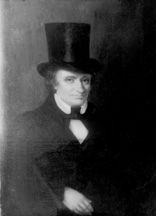 PLEASANTS, James, a Representative and a Senator from Virginia; born at 'Cold Comfort,' in Powhatan County, Va., October 24, 1769; first cousin of Thomas Jefferson, pursued classical studies and graduated from the College of William and Mary, Williamsburg, Va.; studied law; was admitted to the bar and commenced practice in Amelia County in 1791; member, State house of delegates 1797-1802; clerk of the Virginia house of delegates 1803-1811; declined apponointment to the General Court June 24, 1809, and was elected Judge of the Supreme Court of Appeals of VA, January 30, 1811, but resigned February 23, 1811; elected as a Republican to the Twelfth and to the four succeeding Congresses and served from March 4, 1811, to December 14, 1819, when he resigned, having been elected a United States Senator December 10, 1819; chairman, Committee on Public Expenditures (Thirteenth Congress), Committee on Expenditures in the Department of the Navy (Fifteenth Congress); elected as a Republican to the United States Senate to fill the vacancy caused by the resignation of John W. Eppes and served from December 14, 1819, to December 15, 1822, when he resigned; chairman, Committee on Naval Affairs (Sixteenth and Seventeenth Congresses); Governor of Virginia 1822-1825; delegate to the State constitutional conventions in 1829 and 1830; retired and lived on his estate, 'Contention,' near Goochland, Goochland County, Va., where he died on November 9, 1836; interment on his estate.
PLEASANTS, James, a Representative and a Senator from Virginia; born at 'Cold Comfort,' in Powhatan County, Va., October 24, 1769; first cousin of Thomas Jefferson, pursued classical studies and graduated from the College of William and Mary, Williamsburg, Va.; studied law; was admitted to the bar and commenced practice in Amelia County in 1791; member, State house of delegates 1797-1802; clerk of the Virginia house of delegates 1803-1811; declined apponointment to the General Court June 24, 1809, and was elected Judge of the Supreme Court of Appeals of VA, January 30, 1811, but resigned February 23, 1811; elected as a Republican to the Twelfth and to the four succeeding Congresses and served from March 4, 1811, to December 14, 1819, when he resigned, having been elected a United States Senator December 10, 1819; chairman, Committee on Public Expenditures (Thirteenth Congress), Committee on Expenditures in the Department of the Navy (Fifteenth Congress); elected as a Republican to the United States Senate to fill the vacancy caused by the resignation of John W. Eppes and served from December 14, 1819, to December 15, 1822, when he resigned; chairman, Committee on Naval Affairs (Sixteenth and Seventeenth Congresses); Governor of Virginia 1822-1825; delegate to the State constitutional conventions in 1829 and 1830; retired and lived on his estate, 'Contention,' near Goochland, Goochland County, Va., where he died on November 9, 1836; interment on his estate.

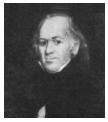 PRESTON, James Patton (1774-1853), ninth child of Col. Wm Preston and Susanna Smith. He married Ann Barraud Taylor in Norfolk, VA, June 23, 1801. They had 6 children. He was a member of the State Senate of Virginia, a Colonel in the U.S. Army and the 21st Governor of Virginia, 1816-19; father of William Ballard Preston; brother-in-law of John Floyd (Gov. VA 1830-1834); uncle of James McDowell (Gov. VA 1843-46) and John Buchanan Floyd (Gov. VA 1849-1852). Born at Smithfield Plantation, Montgomery County, June 21, 1774. Died May 4, 1853 at Smithfield. Interment Preston Cemetery, Smithfield.
PRESTON, James Patton (1774-1853), ninth child of Col. Wm Preston and Susanna Smith. He married Ann Barraud Taylor in Norfolk, VA, June 23, 1801. They had 6 children. He was a member of the State Senate of Virginia, a Colonel in the U.S. Army and the 21st Governor of Virginia, 1816-19; father of William Ballard Preston; brother-in-law of John Floyd (Gov. VA 1830-1834); uncle of James McDowell (Gov. VA 1843-46) and John Buchanan Floyd (Gov. VA 1849-1852). Born at Smithfield Plantation, Montgomery County, June 21, 1774. Died May 4, 1853 at Smithfield. Interment Preston Cemetery, Smithfield.

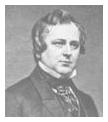 PRESTON, William Ballard, (nephew of Francis Preston), a Representative from Virginia; born in Smithfield, Va., November 25, 1805; was graduated from the College of William and Mary, Williamsburg, Va., in 1823; studied law and was graduated from the University of Virginia at Charlottesville; was admitted to the bar and commenced practice in 1826; member of the State house of delegates 1830-1832; served in the State senate 1840-1844; again a member of the State house of delegates in 1844 and 1845; elected as a Whig to the Thirtieth Congress (March 4, 1847-March 3, 1849); appointed Secretary of the Navy in the Cabinet of President Taylor and served from March 8, 1849, to July 22, 1850; delegate to the State constitutional convention in 1861; served in the Confederate States Congress; died in Smithfield, Va., on November 16, 1862; interment in Preston Cemetery on the former Smithfield Plantation, Blacksburg, Va.
PRESTON, William Ballard, (nephew of Francis Preston), a Representative from Virginia; born in Smithfield, Va., November 25, 1805; was graduated from the College of William and Mary, Williamsburg, Va., in 1823; studied law and was graduated from the University of Virginia at Charlottesville; was admitted to the bar and commenced practice in 1826; member of the State house of delegates 1830-1832; served in the State senate 1840-1844; again a member of the State house of delegates in 1844 and 1845; elected as a Whig to the Thirtieth Congress (March 4, 1847-March 3, 1849); appointed Secretary of the Navy in the Cabinet of President Taylor and served from March 8, 1849, to July 22, 1850; delegate to the State constitutional convention in 1861; served in the Confederate States Congress; died in Smithfield, Va., on November 16, 1862; interment in Preston Cemetery on the former Smithfield Plantation, Blacksburg, Va.

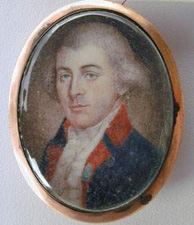 REED, Philip, a Senator and a Representative from Maryland; born near Chestertown, Kent County, Md., in 1760; completed preparatory studies; served in the Revolutionary Army, attaining the rank of captain of infantry; member, State house of delegates 1787; sheriff of Kent County 1791-1794; member of the executive council 1805-1806; elected as a Republican to the United States Senate in 1806 to fill the vacancy caused by the resignation of Robert Wright; reelected the same year and served from November 25, 1806, to March 3, 1813; lieutenant colonel of the Twenty-first Regiment, Maryland Militia, in the War of 1812 and lieutenant colonel commandant of the First Regiment, Maryland Militia, in 1814; elected to the Fifteenth Congress (March 4, 1817-March 3, 1819); unsuccessful candidate for reelection in 1818 to the Sixteenth Congress; successfully contested the election of Jeremiah Cosden to the Seventeenth Congress and served from March 19, 1822, to March 3, 1823; died in Huntingtown, Kent County, Md., November 2, 1829; interment in the cemetery of Christ Church, near Chestertown, Md.
REED, Philip, a Senator and a Representative from Maryland; born near Chestertown, Kent County, Md., in 1760; completed preparatory studies; served in the Revolutionary Army, attaining the rank of captain of infantry; member, State house of delegates 1787; sheriff of Kent County 1791-1794; member of the executive council 1805-1806; elected as a Republican to the United States Senate in 1806 to fill the vacancy caused by the resignation of Robert Wright; reelected the same year and served from November 25, 1806, to March 3, 1813; lieutenant colonel of the Twenty-first Regiment, Maryland Militia, in the War of 1812 and lieutenant colonel commandant of the First Regiment, Maryland Militia, in 1814; elected to the Fifteenth Congress (March 4, 1817-March 3, 1819); unsuccessful candidate for reelection in 1818 to the Sixteenth Congress; successfully contested the election of Jeremiah Cosden to the Seventeenth Congress and served from March 19, 1822, to March 3, 1823; died in Huntingtown, Kent County, Md., November 2, 1829; interment in the cemetery of Christ Church, near Chestertown, Md.

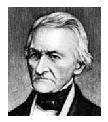 RITCHIE, Thomas (1778-1854), Printer to the Commonwealth of Virginia, edited the Richmond Enquirer from 1804 to 1845 and was one of the South's most-quoted Democratic Party spokesmen. The period from the 1830s to the 1850s was the high point of partisan journalism in the United States, and editors like Ritchie helped both state and national political leaders formulate their policies and sell those policies and candidates to the voters. An opponent during the 1820s of John Quincy Adams and Henry Clay and their plans to use the power of the national government to promote economic growth, Ritchie and many Democratic Party leaders in Virginia and in the South supported states' rights faction leaders such as Andrew Jackson. In 1845 former President Martin Van Buren asked Ritchie to move to Washington, D.C., to create a new national newspaper for the Democrats. Ritchie edited the Union until he retired in 1851, and was widely respected as one of the most influential Democrats in the United States.
RITCHIE, Thomas (1778-1854), Printer to the Commonwealth of Virginia, edited the Richmond Enquirer from 1804 to 1845 and was one of the South's most-quoted Democratic Party spokesmen. The period from the 1830s to the 1850s was the high point of partisan journalism in the United States, and editors like Ritchie helped both state and national political leaders formulate their policies and sell those policies and candidates to the voters. An opponent during the 1820s of John Quincy Adams and Henry Clay and their plans to use the power of the national government to promote economic growth, Ritchie and many Democratic Party leaders in Virginia and in the South supported states' rights faction leaders such as Andrew Jackson. In 1845 former President Martin Van Buren asked Ritchie to move to Washington, D.C., to create a new national newspaper for the Democrats. Ritchie edited the Union until he retired in 1851, and was widely respected as one of the most influential Democrats in the United States.

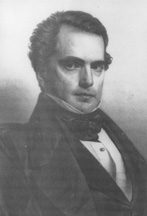 RIVES, William Cabell, a Representative and a Senator from Virginia; born at 'Union Hill,' Amherst County, Va., May 4, 1793; attended Hampden-Sidney College in Virginia and graduated from the College of William and Mary, Williamsburg, Va., in 1809; studied law under the direction of Thomas Jefferson, 1809-1811; was admitted to the bar about 1814 and commenced practice in Charlottesville, Albemarle County; aide-de-camp to Gen. John H. Cooke 1814-1815; delegate to the State constitutional convention in 1816; member, State house of delegates 1817-1820, 1822-1823; moved to 'Castle Hill,' Albemarle County, in 1821; elected to the Eighteenth and to the three succeeding Congresses and served from March 4, 1823, until his resignation in 1829; Minister to France 1829-1832; elected as a Jacksonian to the United States Senate to fill the vacancy caused by the resignation of Littleton W. Tazewell and served from December 10, 1832, to February 22, 1834, when he resigned; again elected to the United States Senate to fill the vacancy caused by the resignation of John Tyler and served from March 4, 1836, to March 3, 1839; chairman, Committee on Naval Affairs (Twenty-fourth and Twenty-fifth Congresses); subsequently reelected as a Whig on January 18, 1841, for the term beginning March 4, 1839, and served until March 3, 1845; chairman, Committee on Foreign Relations (Twenty-seventh Congress); again Minister to France 1849-1853; member of the peace convention of 1861 held in Washington, D.C., in an effort to devise means to prevent the impending war; delegate from Virginia to the Confederate Provisional Congress in Montgomery, Ala., and Richmond, Va., in 1861; member of the house of representatives from Virginia in the Second Confederate Congress. He was the author of: "The Life and Character of John Hampden', (1845); "Ethics of Christianity" (1855); "The Life and Times of James Madison" (3 vols. 1859-1869). He died on his plantation, 'Castle Hill,' near Charlottesville, Va., April 25, 1868; interment in the private burial ground on the family estate.
RIVES, William Cabell, a Representative and a Senator from Virginia; born at 'Union Hill,' Amherst County, Va., May 4, 1793; attended Hampden-Sidney College in Virginia and graduated from the College of William and Mary, Williamsburg, Va., in 1809; studied law under the direction of Thomas Jefferson, 1809-1811; was admitted to the bar about 1814 and commenced practice in Charlottesville, Albemarle County; aide-de-camp to Gen. John H. Cooke 1814-1815; delegate to the State constitutional convention in 1816; member, State house of delegates 1817-1820, 1822-1823; moved to 'Castle Hill,' Albemarle County, in 1821; elected to the Eighteenth and to the three succeeding Congresses and served from March 4, 1823, until his resignation in 1829; Minister to France 1829-1832; elected as a Jacksonian to the United States Senate to fill the vacancy caused by the resignation of Littleton W. Tazewell and served from December 10, 1832, to February 22, 1834, when he resigned; again elected to the United States Senate to fill the vacancy caused by the resignation of John Tyler and served from March 4, 1836, to March 3, 1839; chairman, Committee on Naval Affairs (Twenty-fourth and Twenty-fifth Congresses); subsequently reelected as a Whig on January 18, 1841, for the term beginning March 4, 1839, and served until March 3, 1845; chairman, Committee on Foreign Relations (Twenty-seventh Congress); again Minister to France 1849-1853; member of the peace convention of 1861 held in Washington, D.C., in an effort to devise means to prevent the impending war; delegate from Virginia to the Confederate Provisional Congress in Montgomery, Ala., and Richmond, Va., in 1861; member of the house of representatives from Virginia in the Second Confederate Congress. He was the author of: "The Life and Character of John Hampden', (1845); "Ethics of Christianity" (1855); "The Life and Times of James Madison" (3 vols. 1859-1869). He died on his plantation, 'Castle Hill,' near Charlottesville, Va., April 25, 1868; interment in the private burial ground on the family estate.

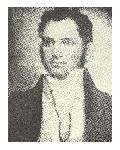 ROANE, Spencer, Born in Essex County, Virginia on 4 April 1762. Graduate of The College of William and Mary. Admitted to the Virginia bar in 1782. Member of the Virginia House of Delegates (1783, 1784) and the Virginia State Senate (1788-1789); judge, Virginia General Court (1789) and Virginia Supreme Court of Appeals (1794-1821). He attended the College of William & Mary, studied law under George Wythe (1726-1806), and was admitted to the bar in 1782. The license, dated 31 October 1782, granted to Spencer Roane, permitting him to practice law in the county courts and other inferior courts in Virginia was signed by Governor Benjamin Harrison. Roane represented Essex County in the House of Delegates from 1783 to 1785, and represented Essex, King William, and King and Queen Counties in the Virginia State Senate from 1788 to 1789. Roane also served on the state privy council from 1784 to 1786. In 1789, he became a judge of the General Court of Virginia, and in 1795, became a judge on the Virginia Court of Appeals, where he served until his death. An advocate of states' rights and strict construction of the federal Constitution, Roane was a judicial opponent of United States Supreme Court Chief Justice John Marshall (1755-1835), Jeffersonian in his beliefs and decisions. Co-founder of the Richmond Enquirer with his nephew, Thomas Ritchie, who edited the Enquirer from 1804 to 1845. Roane's son William Henry Roane (1787-1845) served in the House of Delegates and in the United States Congress. Roane married Anne Henry (1767-1799), the daughter of Patrick Henry (1736-1799), 7 September 1786. After her death, he married Elizabeth Hoskins (1781-1825) of King and Queen County 19 March 1801. Roane died 4 September 1822 at Warm Springs, Bath County, Virginia.
ROANE, Spencer, Born in Essex County, Virginia on 4 April 1762. Graduate of The College of William and Mary. Admitted to the Virginia bar in 1782. Member of the Virginia House of Delegates (1783, 1784) and the Virginia State Senate (1788-1789); judge, Virginia General Court (1789) and Virginia Supreme Court of Appeals (1794-1821). He attended the College of William & Mary, studied law under George Wythe (1726-1806), and was admitted to the bar in 1782. The license, dated 31 October 1782, granted to Spencer Roane, permitting him to practice law in the county courts and other inferior courts in Virginia was signed by Governor Benjamin Harrison. Roane represented Essex County in the House of Delegates from 1783 to 1785, and represented Essex, King William, and King and Queen Counties in the Virginia State Senate from 1788 to 1789. Roane also served on the state privy council from 1784 to 1786. In 1789, he became a judge of the General Court of Virginia, and in 1795, became a judge on the Virginia Court of Appeals, where he served until his death. An advocate of states' rights and strict construction of the federal Constitution, Roane was a judicial opponent of United States Supreme Court Chief Justice John Marshall (1755-1835), Jeffersonian in his beliefs and decisions. Co-founder of the Richmond Enquirer with his nephew, Thomas Ritchie, who edited the Enquirer from 1804 to 1845. Roane's son William Henry Roane (1787-1845) served in the House of Delegates and in the United States Congress. Roane married Anne Henry (1767-1799), the daughter of Patrick Henry (1736-1799), 7 September 1786. After her death, he married Elizabeth Hoskins (1781-1825) of King and Queen County 19 March 1801. Roane died 4 September 1822 at Warm Springs, Bath County, Virginia.

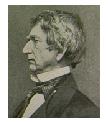 SEWARD, William Henry, a Senator from New York; born in Florida, Orange County, N.Y., on May 16, 1801; after preparatory studies, graduated from Union College in 1820; studied law; was admitted to the bar and commenced practice in Auburn, N.Y., in 1823; member, State senate 1830-1834; unsuccessful Whig candidate for governor in 1834; Governor of New York 1838-1842; elected as a Whig to the United States Senate in 1849; reelected as a Republican in 1855 and served from March 4, 1849, to March 3, 1861; unsuccessful candidate for the Republican nomination for president in 1860; Secretary of State in the Cabinets of Presidents Abraham Lincoln and Andrew Johnson 1861-1869; while Secretary of State concluded the convention with Great Britain for the settlement of the Alabama claims and the treaty with Russia for the purchase of Alaska; died in Auburn, Cayuga County, N.Y., October 10, 1872; interment in Fort Hill Cemetery.
See also William H. Seward
SEWARD, William Henry, a Senator from New York; born in Florida, Orange County, N.Y., on May 16, 1801; after preparatory studies, graduated from Union College in 1820; studied law; was admitted to the bar and commenced practice in Auburn, N.Y., in 1823; member, State senate 1830-1834; unsuccessful Whig candidate for governor in 1834; Governor of New York 1838-1842; elected as a Whig to the United States Senate in 1849; reelected as a Republican in 1855 and served from March 4, 1849, to March 3, 1861; unsuccessful candidate for the Republican nomination for president in 1860; Secretary of State in the Cabinets of Presidents Abraham Lincoln and Andrew Johnson 1861-1869; while Secretary of State concluded the convention with Great Britain for the settlement of the Alabama claims and the treaty with Russia for the purchase of Alaska; died in Auburn, Cayuga County, N.Y., October 10, 1872; interment in Fort Hill Cemetery.
See also William H. Seward

SMITH, George William (1762-1811) Governor of Virginia, 1811. Governor George
William Smith and many other prominent citizens were burned to death December 26, 1811, during a performance of The Bleeding Nun, a disaster that claimed 72 lives. Laws in Virginia and elsewhere to prohibit the opening inward of theater doors resulted from this tragedy. Interment at Monumental Church, Richmond, Va.

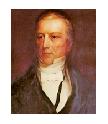 STEVENSON, Andrew, a Representative from Virginia; born in Culpeper County, Va., January 21, 1784; pursued classical studies; attended the College of William and Mary, Williamsburg, Va.; studied law; was admitted to the bar and commenced practice in Richmond, Va.; member of the State house of delegates 1809-1816 and 1818-1821 and served as speaker 1812-1815; unsuccessful candidate in 1814 and 1816 for election to Congress; elected to the Seventeenth Congress; reelected to the Eighteenth through Twentieth Congresses and reelected as a Jacksonian to the Twenty-first through Twenty-third Congresses and served from March 4, 1821, until his resignation, June 2, 1834; Speaker of the House of Representatives (Twentieth through Twenty-third Congresses); Minister to Great Britain 1836-1841; engaged in agricultural pursuits at "Blenheim," Albemarle County, Va.; in 1845 was elected a member of the board of visitors of the University of Virginia at Charlottesville, and in 1856 was elected rector; died at his home, "Blenheim," January 25, 1857; interment in Enniscothy Cemetery, Albemarle County, Va.
STEVENSON, Andrew, a Representative from Virginia; born in Culpeper County, Va., January 21, 1784; pursued classical studies; attended the College of William and Mary, Williamsburg, Va.; studied law; was admitted to the bar and commenced practice in Richmond, Va.; member of the State house of delegates 1809-1816 and 1818-1821 and served as speaker 1812-1815; unsuccessful candidate in 1814 and 1816 for election to Congress; elected to the Seventeenth Congress; reelected to the Eighteenth through Twentieth Congresses and reelected as a Jacksonian to the Twenty-first through Twenty-third Congresses and served from March 4, 1821, until his resignation, June 2, 1834; Speaker of the House of Representatives (Twentieth through Twenty-third Congresses); Minister to Great Britain 1836-1841; engaged in agricultural pursuits at "Blenheim," Albemarle County, Va.; in 1845 was elected a member of the board of visitors of the University of Virginia at Charlottesville, and in 1856 was elected rector; died at his home, "Blenheim," January 25, 1857; interment in Enniscothy Cemetery, Albemarle County, Va.

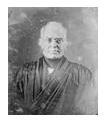 STORY, Joseph, born in Marblehead, Mass., September 18, 1779; attended Marblehead Academy; was graduated from Harvard University in 1798; He married first, Mary Lynde Oliver, 9 December 1804 (d. 1805) and second, Sarah Waldo Wetmore 27 August 1808. Story was admitted to the bar in 1801 and commenced practice in Salem; member of the State house of representatives 1805-1807; elected as a Republican to the Tenth Congress to fill the vacancy caused by the death of Jacob Crowninshield and served from May 23, 1808, to March 3, 1809; was not a candidate for renomination in 1808; again a member of the State house of representatives in 1811, and served as speaker; published commentaries on the Constitution, and also other works; appointed by President Madison as an Associate Justice of the Supreme Court of the United States. The youngest appointee at 32, Story soon became one of the court's leading justices and served from 1811 until his death; elected as an overseer of Harvard University in 1818 and as professor of law in the same institution in 1829, a position which he also held until his death; delegate to the State constitutional convention in 1820; declined the position of chief justice of the Massachusetts Supreme Court in 1831; died in Cambridge, Mass., September 10, 1845; interment in Mount Auburn Cemetery.
STORY, Joseph, born in Marblehead, Mass., September 18, 1779; attended Marblehead Academy; was graduated from Harvard University in 1798; He married first, Mary Lynde Oliver, 9 December 1804 (d. 1805) and second, Sarah Waldo Wetmore 27 August 1808. Story was admitted to the bar in 1801 and commenced practice in Salem; member of the State house of representatives 1805-1807; elected as a Republican to the Tenth Congress to fill the vacancy caused by the death of Jacob Crowninshield and served from May 23, 1808, to March 3, 1809; was not a candidate for renomination in 1808; again a member of the State house of representatives in 1811, and served as speaker; published commentaries on the Constitution, and also other works; appointed by President Madison as an Associate Justice of the Supreme Court of the United States. The youngest appointee at 32, Story soon became one of the court's leading justices and served from 1811 until his death; elected as an overseer of Harvard University in 1818 and as professor of law in the same institution in 1829, a position which he also held until his death; delegate to the State constitutional convention in 1820; declined the position of chief justice of the Massachusetts Supreme Court in 1831; died in Cambridge, Mass., September 10, 1845; interment in Mount Auburn Cemetery.

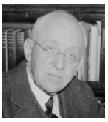 SWEM, Dr. Earl G., 1871-1965, Librarian, College of William and Mary, compiler of the Virginia Historical Index, Roanoke,Va., 1934-36, 2 vols. A complete index of the Calendar of State Papers, vols. I-II; Henings Statutes, vols. I-13; Lower Norfolk County Antiquary, vols.I-5; Virginia Historical Register, vols.I-6; Tyler's Quarterly, vols.I-10; Virginia Magazine of History and Biography, vols. I-38 , William and Mary Quarterly, 1st series vols.I-27, 2nd series vols.I-10.
SWEM, Dr. Earl G., 1871-1965, Librarian, College of William and Mary, compiler of the Virginia Historical Index, Roanoke,Va., 1934-36, 2 vols. A complete index of the Calendar of State Papers, vols. I-II; Henings Statutes, vols. I-13; Lower Norfolk County Antiquary, vols.I-5; Virginia Historical Register, vols.I-6; Tyler's Quarterly, vols.I-10; Virginia Magazine of History and Biography, vols. I-38 , William and Mary Quarterly, 1st series vols.I-27, 2nd series vols.I-10.
Dr. Swem's achievements as a historian, bibliographer and librarian earned him praise and gratitude during his long career, which started in high school at the Iowa Masonic Library in Cedar Rapids, Iowa. After graduation from Lafayette College, he moved on to the Library of Congress, serving there as chief of the Catalog Division until 1907, when he was named assistant state librarian. He not only built up the collection of the Virginia State Library in his twelve years there, but also began his crucial work in Virginia bibliography, compiling finding lists and bibliographies of the State Library's books, manuscript materials, and historical records.
Swem continued this work at the College of William and Mary, at which he
served as librarian from 1919 to 1944. Under his direction, the William and Mary library collection grew from twenty-five thousand books and twenty thousand manuscripts to more than two hundred forty thousand books and approximately four hundred thousand manuscripts. Swem also used his position to make the library more accessible to its patrons, by offering classes on library use to students and library assistants and, in a practice almost unheard of at that time, opening the stacks to students and the public.
Swem's achievements as a bibliographer reached their peak during his years at William and Mary, when in 1936 he completed the Virginia Historical Index, an invaluable source for historians of Virginia. After his retirement from William and Mary in 1944, Swem served as librarian emeritus and continued to edit books and manuscripts on Virginia history. He died aged ninety-four in 1965, a year before the completion of William and Mary's new library, designated the Earl Gregg Swem Library in honor of his contributions to the library collection and to historical research. See also Swem Library

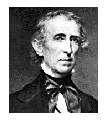 TYLER, John, a Representative and a Senator from Virginia, a Vice President and 10th President of the United States; born in Charles City County, Va., March 29, 1790; attended private schools and graduated from the College of William and Mary, Williamsburg, Va., in 1807; studied law; was admitted to the bar in 1809 and commenced practice in Charles City County; captain of a military company in 1813; member, State house of delegates 1811-1816; member of the council of state in 1816; elected as a Republican to the Fourteenth Congress to fill the vacancy caused by the death of John Clopton; reelected to the Fifteenth and Sixteenth Congresses and served from December 16, 1817, to March 3, 1821; declined to be a candidate for renomination in 1820 because of impaired health; member, State house of delegates 1823-1825; Governor of Virginia 1825-1827; elected to the United States Senate in 1827; reelected in 1833 and served from March 4, 1827, to February 29, 1836, when he resigned; served as President pro tempore of the Senate during the Twenty-third Congress; chairman, Committee on the District of Columbia (Twenty-third and Twenty-fourth Congresses), Committee on Manufactures (Twenty-third Congress); member of the State constitutional convention in 1829 and 1830; member, State house of delegates 1839; elected Vice President of the United States on the Whig ticket with William Henry Harrison in 1840; was inaugurated March 4, 1841, and served until the death of President Harrison April 4, 1841; took the oath of office as President of the United States April 6, 1841, and served until March 3, 1845; did not seek reelection; Tyler was the most prolific of all American President: he had 15 children and two wives. In 1813, Tyler married Letitia Christian, the daughter of a Virginia planter. They had eight children. She was an invalid when Tyler became president and made only one public appearance, at her daughter Elizabeth's marriage in 1842. Letitia Christian Tyler, the President's first wife, died in the White House in September, 1842. A few months later, Tyler began courting 23-year-old Julia Gardiner, a beautiful and wealthy New Yorker. When they were married in New York City on June 26, 1844, Tyler became the first president to be wed while in office. He was 30 years older than his bride.
TYLER, John, a Representative and a Senator from Virginia, a Vice President and 10th President of the United States; born in Charles City County, Va., March 29, 1790; attended private schools and graduated from the College of William and Mary, Williamsburg, Va., in 1807; studied law; was admitted to the bar in 1809 and commenced practice in Charles City County; captain of a military company in 1813; member, State house of delegates 1811-1816; member of the council of state in 1816; elected as a Republican to the Fourteenth Congress to fill the vacancy caused by the death of John Clopton; reelected to the Fifteenth and Sixteenth Congresses and served from December 16, 1817, to March 3, 1821; declined to be a candidate for renomination in 1820 because of impaired health; member, State house of delegates 1823-1825; Governor of Virginia 1825-1827; elected to the United States Senate in 1827; reelected in 1833 and served from March 4, 1827, to February 29, 1836, when he resigned; served as President pro tempore of the Senate during the Twenty-third Congress; chairman, Committee on the District of Columbia (Twenty-third and Twenty-fourth Congresses), Committee on Manufactures (Twenty-third Congress); member of the State constitutional convention in 1829 and 1830; member, State house of delegates 1839; elected Vice President of the United States on the Whig ticket with William Henry Harrison in 1840; was inaugurated March 4, 1841, and served until the death of President Harrison April 4, 1841; took the oath of office as President of the United States April 6, 1841, and served until March 3, 1845; did not seek reelection; Tyler was the most prolific of all American President: he had 15 children and two wives. In 1813, Tyler married Letitia Christian, the daughter of a Virginia planter. They had eight children. She was an invalid when Tyler became president and made only one public appearance, at her daughter Elizabeth's marriage in 1842. Letitia Christian Tyler, the President's first wife, died in the White House in September, 1842. A few months later, Tyler began courting 23-year-old Julia Gardiner, a beautiful and wealthy New Yorker. When they were married in New York City on June 26, 1844, Tyler became the first president to be wed while in office. He was 30 years older than his bride.
Tyler was delegate to and president of the peace convention held in Washington, D.C., in 1861 in an effort to devise means to prevent the impending war; delegate to the Confederate Provisional Congress in 1861; elected to the House of Representatives of the Confederate Congress, but died in Richmond, Va., January 18, 1862, before the assembling of the Congress; interment in Hollywood Cemetery.

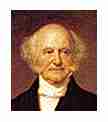 VAN BUREN, Martin, a Senator from New York and a Vice President and 8th President of the United States; born in Kinderhook, Columbia County, N.Y., December 5, 1782; attended the village schools; studied law; was admitted to the bar and commenced practice in Kinderhook, N.Y., in 1803; moved to Hudson, N.Y., in 1809; surrogate of Columbia County 1808-1813; member, State senate 1813-1820; attorney general of New York 1816-1819; delegate to the State constitutional convention in 1821; elected to the United States Senate; reelected in 1827, and served from March 4, 1821, until December 20, 1828, when he resigned, having been elected Governor; chairman, Committee on the Judiciary (Eighteenth through Twentieth Congresses); Governor of New York from January to March 1829, when he resigned to enter the Cabinet; appointed Secretary of State in the Cabinet of President Andrew Jackson and served from March 1829, until his resignation, effective May 1831, when he was commissioned Minister to Great Britain; the Senate rejected his nomination in January 1832, and he returned to the United States; elected, as a Democrat, Vice President of the United States on the ticket with Andrew Jackson and served from March 4, 1833, to March 3, 1837; elected, as a Democrat, President of the United States and served from March 4, 1837, to March 3, 1841; unsuccessful candidate for reelection as President on the Democratic ticket in 1840 and on the Free-Soil ticket in 1848; withdrew from political life and retired to his country home, 'Lindenwald,' in Kinderhook, N.Y., where he died July 24, 1862; interment in Kinderhook Cemetery.
VAN BUREN, Martin, a Senator from New York and a Vice President and 8th President of the United States; born in Kinderhook, Columbia County, N.Y., December 5, 1782; attended the village schools; studied law; was admitted to the bar and commenced practice in Kinderhook, N.Y., in 1803; moved to Hudson, N.Y., in 1809; surrogate of Columbia County 1808-1813; member, State senate 1813-1820; attorney general of New York 1816-1819; delegate to the State constitutional convention in 1821; elected to the United States Senate; reelected in 1827, and served from March 4, 1821, until December 20, 1828, when he resigned, having been elected Governor; chairman, Committee on the Judiciary (Eighteenth through Twentieth Congresses); Governor of New York from January to March 1829, when he resigned to enter the Cabinet; appointed Secretary of State in the Cabinet of President Andrew Jackson and served from March 1829, until his resignation, effective May 1831, when he was commissioned Minister to Great Britain; the Senate rejected his nomination in January 1832, and he returned to the United States; elected, as a Democrat, Vice President of the United States on the ticket with Andrew Jackson and served from March 4, 1833, to March 3, 1837; elected, as a Democrat, President of the United States and served from March 4, 1837, to March 3, 1841; unsuccessful candidate for reelection as President on the Democratic ticket in 1840 and on the Free-Soil ticket in 1848; withdrew from political life and retired to his country home, 'Lindenwald,' in Kinderhook, N.Y., where he died July 24, 1862; interment in Kinderhook Cemetery.

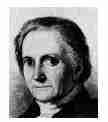 WASHINGTON, Bushrod, lived in the shadow of his uncle, George Washington, and never quite distanced himself from the spector of his uncle's influence. Bushrod surely acheived a measure of prominence if not distinction, reaching the nation's highest court as its eleventh justice. But Bushrod Washington was never in the same league as George.
WASHINGTON, Bushrod, lived in the shadow of his uncle, George Washington, and never quite distanced himself from the spector of his uncle's influence. Bushrod surely acheived a measure of prominence if not distinction, reaching the nation's highest court as its eleventh justice. But Bushrod Washington was never in the same league as George.
A "short, untidy man who liked snuff and suffered from ill health," Washington was born on June 5, 1762, in Westmoreland County, Virginia. Studious in his youth, Bushrod Washington began to hobnob with the famous thinkers of his time while at the College of William and Mary, from which he graduated at age sixteen. There he shared classes with future Chief Justice John Marshall.
Bushrod Washington's books and quill pens were soon replaced by rifles and ammunition when he joined the army towards the end of the Revolutionary War. After the British waved the white flag and his soldiering days were over, Uncle George sponsored Bushrod a law apprentice.
An interest in politics led Bushrod to the Virginia House of Delegates in 1787 and also to the Virginia ratifying convention for the Constitution. However, the thrill of the campaign trail faded fast, and he returned to private law practice and teaching in 1790. Such activities were his passions, and he may have never entered the national political scene again if not for his uncle George, who strongly encouraged his nephew to run for the Virginia legislature in 1798. Bushrod reluctantly agreed.
B. Washington's days as an elected state official were not to be. In the year of the would-be campaign, Supreme Court Justice James Wilson died creating a vacancy on the High Bench. Washington and Marshall were the two replacement candidates on President John Adams' short list of Federalist Virginians. When Marshall refused the position, B. Washington received the nod. He was only thirty six years old when he took the oath of office on February 4, 1799.
Washington was not a distinguished justice. Pundits classify his performance as average to forgettable, and Washington's written opinions during his 30+ years on the bench were few and far between. Rather than speak out, Washington proved a loyal follower of Chief Justice John Marshall. Washington disagreed with Marshall only three times during the years they shared on the bench.
If anything, it was Bushrod's life outside the Court that caused the most excitement in his time. George Washington left his entire estate at Mount Vernon to his nephew, making his wishes known that the Mount Vernon slaves there were to be freed. Bushrod followed his uncle's instructions, but then he brought his own slaves to Mount Vernon, selling them on the block when money troubles arose. Bushrod Washington, who believed in African resettlement for blacks, was promptly attacked by abolitionists and others for not following his uncle's example.
Bushrod Washington died Nov. 26, 1829 as he had spent most of his adult life - working at the law, this time on circuit court duty in Philadelphia. His bereaved wife died just three days later while transporting his body for burial.

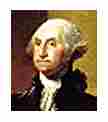 WASHINGTON, George, a Delegate from Virginia and first President of the United States; born at "Wakefield," near Popes Creek, Westmoreland County, Va., February 22, 1732; raised in Westmoreland County, Fairfax County and King George County; attended local schools and engaged in land surveying; appointed adjutant general of a military district in Virginia with the rank of major in 1752; in November 1753 was sent by Lieutenant Governor Dinwiddie, of Virginia, to conduct business with the French Army in the Ohio Valley; in 1754 was promoted to the rank of lieutenant colonel and served in the French and Indian war, becoming aide-de-camp to General Braddock in 1755; appointed as commander in chief of Virginia forces in 1755; resigned his commission in December 1758 and returned to the management of his estate at Mount Vernon in 1759; served as a justice of the peace, 1760-1774, and as a member of the Virginia house of burgesses, 1758-1774; delegate to the Williamsburg convention of August 1774; Member of the First and Second Continental Congresses in 1774 and 1775; unanimously chosen June 15, 1775, as commander in chief of all the forces raised or to be raised; commanded the Continental armies throughout the war for independence; resigned his commission December 23, 1783, and returned to private life at Mount Vernon; was delegate to, and president of, the Federal Convention in Philadelphia in 1787; unanimously elected as the first President of the United States, being inaugurated April 30, 1789, in New York City; unanimously reelected in 1792 and served until March 3, 1797, after declining a renomination; again appointed as lieutenant general and commander of the United States Army July 3, 1798, and served until his death December 14, 1799, in Mount Vernon, Va.; interment in the vault at Mount Vernon.
WASHINGTON, George, a Delegate from Virginia and first President of the United States; born at "Wakefield," near Popes Creek, Westmoreland County, Va., February 22, 1732; raised in Westmoreland County, Fairfax County and King George County; attended local schools and engaged in land surveying; appointed adjutant general of a military district in Virginia with the rank of major in 1752; in November 1753 was sent by Lieutenant Governor Dinwiddie, of Virginia, to conduct business with the French Army in the Ohio Valley; in 1754 was promoted to the rank of lieutenant colonel and served in the French and Indian war, becoming aide-de-camp to General Braddock in 1755; appointed as commander in chief of Virginia forces in 1755; resigned his commission in December 1758 and returned to the management of his estate at Mount Vernon in 1759; served as a justice of the peace, 1760-1774, and as a member of the Virginia house of burgesses, 1758-1774; delegate to the Williamsburg convention of August 1774; Member of the First and Second Continental Congresses in 1774 and 1775; unanimously chosen June 15, 1775, as commander in chief of all the forces raised or to be raised; commanded the Continental armies throughout the war for independence; resigned his commission December 23, 1783, and returned to private life at Mount Vernon; was delegate to, and president of, the Federal Convention in Philadelphia in 1787; unanimously elected as the first President of the United States, being inaugurated April 30, 1789, in New York City; unanimously reelected in 1792 and served until March 3, 1797, after declining a renomination; again appointed as lieutenant general and commander of the United States Army July 3, 1798, and served until his death December 14, 1799, in Mount Vernon, Va.; interment in the vault at Mount Vernon.

WHITE, Robert, Judge of the Superior Court of Law, District of Virginia, Berkeley County, served as an officer in the American Army during the Revolution, entered the bar August 17, 1790, married a Miss Baker, lived at Winchester, Virginia and was a member of the committee of revisors of the Laws of Virginia.

This Internet Presentation is Copyright TONA Research Committee
Please contact the Committee for reprint permission.

[TONA Committee Email]
Last updated: October 15, 2002
For problems or questions regarding this web site contact
Webmaster
